
- Mar 24, 2021

Essays in 6th Grade: A Basic Format that Elevates the Standard 5-Paragraph Structure

6th grade is such a funny year. Funny haha and funny weird. Student writing levels are all over the map. You will have students coming to you writing on a very elementary level, still needing loads of help with grammar and paragraph formation. Then, you will have students ready to write critique pieces and analyses. How do you navigate this? Read to find out more!
Give Them a Format...to Start
I've learned that 6th graders still need format . They still need structure. They still need checklists. As much as I loathe limiting them in this way, I think it is very reassuring to them. That's not to say you can't tweak for the strong writers, but I do still feel they need it.
For my students in particular, I like to let them dabble in looser formats of non-fiction writing in other ways. They do book reviews , a debate , podcasting , etc. They are offered choices in reading responses to non-fiction reading and analysis, too. My classes actually write digital eBooks, too. But on the whole, they are expected to write two essays with a very similar format twice a year.
Bye-Bye 5-Paragraph Essay
Alright, so this is kind of not totally true. My students do end up writing 5 paragraphs, but that typical structure we all commonly know, I navigate away from. I think it's a fine format, but as they get into middle school they are expected to compare a LOT more and not focus on one specific topic . They are expected to follow through on a thread, a claim, a theme, an idea and how it is shown in various sources. And this is super new for them, analyzing various sources on the same concept. They really need a structure for this.
So, the typical essay, before they get to me, goes like this, and it is a good precursor:
Introduction that states your thesis and 3 major reasons to support your claim.
Conclusion that looks a whole lot like the introduction.
This format does not allow analysis of multiple sources and if you throw in other sources, it gets messy. Instead, I gear my students to focus on each source separately, then comparing them all.
The Format that Works (Research and Literary Analysis)
First of all, it's important to know what essays I actually do with my kiddos. I do a research unit. This changes almost every year, but typically they choose some kind of topic, I group them based on their topic choice. First, they do research (non-fiction skills) using a book, article, and video. They then use those sources to write an essay on a claim they make based on their topic. Later, they make eBooks in groups based on their topic.
The other essay I do is Literary Analysis . This follows a dystopian unit . They read a dystopian book in book clubs. Then, I have them choose from a short list of short stories that are dystopian. Lastly, we watch the movie The Truman Show . (This year I had them watch "The Scarecrow" on YouTube since we were hybrid due to the pandemic). They then determine a theme that is true for all three sources and write an essay based on that theme.
This essay format works for both of these essays. So here it goes!

Introductory and Conclusion Statements
In a traditional essay, students have to write a hook, their claim/thesis, and essentially ANOTHER three sentences that state what their essays will be about. In my opinion, all of this is completely unnecessary. How many times do you read introductions in books? Okay, real avid readers do, but in reality many people don't. So for these, I tell my students to get right to the point .
Here's what should be in their introductory and conclusion statements:
A statement that introduces the topic. (This is a hook of some kind. I sometimes tell them to start it with "in our world..." or "in our lives..." and something that relates to their topic. Or just starting it with their topic and explaining what it is.)
The claim/thesis.
A statement that references there are differences and similarities in the sources. (For example: "[Title of sources] support this claim in different and similar ways." That's it.)
This all ends up being 2-3 sentences.
Topic Sentences
I have my students start their essay prep with topic sentences. This helps them get a sense of where their essays will go.
The big thing to understand here is how the paragraphs are set up .
Body #1 : Focus on source #1 and how it shows claim/thesis.
Body #2 : Focus on source #2 and how it shows claim/thesis.
Body #3 : Focus on source #3 and how it shows claim/thesis.
Body #4 : Focus on how ALL SOURCES show the claim/thesis in the same way.
So they start with creating topic sentences for those paragraphs. Each topic sentence is set up like this. The last topic sentence would start with "all sources..." instead of "source title".:

Body Paragraph Format
In the picture you see below, I have specific colors for specific aspects of body paragraphs. ALL body paragraphs follow this format in that exact sequence/order. I will be completely honest, I don't give them a ton of wiggle room since this is pretty new to them. However, my stronger writers dabble in mixing evidence stems and elaboration stems around.

Their paragraph starts with the topic sentence they already prepared. From there, the next sentence begins with an evidence stem . Here are a few examples of evidence stems:
According to the text,
The author states,
In [title],
Right after the evidence stem, in the same sentence, they add their text detail to support their topic sentence. I encourage them to quote exactly from the text for most text details. They can paraphrase, too, but should really try to get exact lines.
In regards to quoting, I also mention to them not to quote plop . I made this up. I plan on making a product for this at some point. A quote plop is bad . It's when students take a line from the text and just plop it in their essay. I show them how to break up the quote from the text with their own words.
So, a first sentence may look like this: According to the text [evidence stem, highlighted green] , when Luke was hiding due to being a third child, "they took the woods away" , [text detail with context, a.k.a. not just plopping the quote in the sentence, highlighted yellow].
Directly after that sentence should be an elaboration stem with an elaboration explaining how the text detail shows their claim/thesis. Students highlight this entire sentence in blue and their claim within it dark blue. Here are some elaboration stems:
This proves [claim] because...
This shows [claim] because ...
After that they do the same process two more times; two more text details with elaborations. Lastly they do a closing sentence .

Comparison Paragraph: This is set up almost exactly the same, except the focus is on how ALL the sources show the claim in the same way. They then provide a NEW text detail from each source to prove how the claim is being shown similarly in each.

Once all their body paragraphs are written, I have them go review their introductory and conclusion statements, put everything into a final draft and leave the highlights in the essay . This helps them visualize all the components and helps me grade!
For revision, the focus is on not quote plopping, being sure their details support their thesis, changing up the wording of claims/theses, and rearranging for strong writers.
Bottom Line
While this is very limiting for some, it is super helpful for struggling writers. Having that checklist and having the highlights helps students visualize what they need to compare sources in an essay format.
I'd say it'd be great to introduce this in 6th and by 8th, they can certainly make these more interpretive, creative, and unique.
You can find a lot more detail about this in the product below . What you see here is only a taste. This contains a full sample essay, checklists, tips, and more. You can also edit it to meet your needs.

************
Want a custom bundle from me click below.

Teachers Pay Teachers Store
Recent Posts
Spring Things! Fun with Poetry and Figurative Language
Text Structure Explanatory Writing: Creating a Dodecahedron
Why I Don't Do a Daily Reading Log: What I Do Instead
Really interesting - thank you!!
This exactly the kind of thing I've been looking for, and even better! I love your approach and it's so well explained. I couldn't disagree more with any of the negative feedback to this article. I think it's perfect for my style of teaching and my standard of writing. Most of all, the way you explained this and broke it down into small steps will make it so achievable for even lagging students to develop great writing skills and feel confident in the process! You nailed it. Thank you so much!
I read all the essay writing format instructions. All the points are useful for any kind of essay writing. But at the age of high-level essay writing learners need to be essay writer experts like the 6 Dollars Essay Website , ready to do professional essay writing for any essay grade.
This is beyond me and I teach HS English. Where does this lady teach, at Princeton? I do not know any 6th grader that does this or would understand this. I see why so many of our young people have become disinterested in the learning process. I also see why so many teachers quit. The profession is stale, boring, and antiquated. This article was not fun to read and I'm thinking this new 5 paragraph writing style would be a drag for the average ela teacher to teach.
. In the blog post, I mention the various types of writing I do with students. I also have other blog posts that discuss these other formats. This is not the end all be all. In my over a decade experience with teaching writing, having a structure helps struggling writers. This is not a writing style. This a format for one type of writing. As teachers, we should be offering all types of formats, especially with younger writers who are still learning how to write.

How to Write a Sixth-Grade Essay

How to Write a Fifth-Grade Essay
Completing an essay for a sixth-grade writing assignment can be accomplished within only a few hours of your time. The five-paragraph format is commonly used in sixth grade. This format contains the introduction, three body paragraphs and a conclusion. By writing an essay correctly during sixth grade, you will be preparing for more in-depth writing in years to come, as you continue your education through high school and even college.
Write an introductory paragraph for your essay, which will include a thesis statement and three to five sentences that support it. A thesis statement will describe the basic point that you are trying to get across in your paper. The remaining sentences should act as an outline for the rest of your paper.
Write out the next three paragraphs, which are the body of the essay paper. Make your strongest claim to support your thesis statement in the first body paragraph. The second should be the next strongest, and the third should be the final part of your argument. Be sure to use strong verbs in the supportive sentences to reinforce the thesis statement, for this is one of the capabilities you will be expected to exhibit in your sixth-grade writing development. Keeping a consistent voice within the body paragraphs, as well as the rest of the essay, is also another ability that sixth-grade teachers are going to be looking for when grading. Correct transitions between the paragraphs will also show your writing skills to your teacher as well. These paragraphs should also be three to five sentences each.
Finish your sixth-grade essay by writing the final paragraph, which is its conclusion. Summarize the statements made in the body paragraphs to reiterate the thesis statement made in the first one. Persuade the reader to see your view on the topic, based on the points made throughout the piece, and indicate that the essay is reaching its succession by making a closing statement.
- Revise a draft of the essay to evaluate the word choices, substituting with vocabulary you have learned during your spelling exercises, before making a final copy that will be turned in to your teacher.
- Comparing and editing drafts before writing the official version is a commonly taught part of the sixth-grade curriculum and will help make for a better final essay overall.
- Sixth-grade students will also have to actively partake in peer reviews, so have another student read your drafts to ensure the essay has a natural flow. Another perspective may bring certain things to your attention that you may not notice on your own.
Related Articles

How to Introduce a Research Paper Sample

How to Write an Introduction to an Analytical Essay

What Is a High School Level Narrative Paragraph?

How to Write a One Page Essay

How to Write an Introduction to a Reflective Essay

How to Write an Essay About a Novel
How to convert your gpa to a sat score.

Guidelines for a Reflection & Summary Paper
Based in Florida, Robert Ceville has been writing electronics-based articles since 2009. He has experience as a professional electronic instrument technician and writes primarily online, focusing on topics in electronics, sound design and herbal alternatives to modern medicine. He is pursuing an Associate of Science in information technology from Florida State College of Jacksonville.
6th grade writing
by: Hank Pellissier | Updated: August 4, 2022
Print article

This year, your sixth grader should learn to use precise language, the right pronouns, and high-quality sources for research. Public presentations are also a nerve-wracking but important skill highlighted this year. Read on to learn the key sixth grade writing skills your child should learn this year.
Introducing argument writing
Developmentally, sixth graders are entering a rebellious phase. Luckily, all this attitude has an academic outlet: argument writing . Your tween will write persuasive essays that promote their bold opinions with organized logic, backed by evidence from carefully researched, respectable sources. ( Wikipedia , The Onion , and National Enquirer won’t qualify, but Wikipedia does often link to sources at the bottom of their entries that may be acceptable.)
Your 11- or 12-year-old will also write formal essays that explain complicated topics with precise information. They’ll start with intriguing introductions, and then present their research in a clear, organized way. They will use quotes, facts, definitions, compare-and-contrast statements, cause-and-effect statements, graphics (e.g., charts, graphs), subject-specific vocabulary, and multimedia. It will all be formatted (e.g., using headings, subheadings, and bullet points), to make their points clear. They’ll end with concluding paragraphs that recap their main points.
“ To put it another way, Mommy, there is compelling evidence that I need another scoop of ice cream. ” This grown-up language sounds amusingly hoity-toity in squeaky voices, but don’t laugh when your child attempts it in daily conversation. Indeed, it is good practice for their writing.
Incredibly, what happened next was..
Storytelling is a fun part of sixth grade writing. This year, kids practice narrative writing in fiction and nonfiction papers. They learn effective ways to select their narrator, characters, setting, dialogue, descriptions, and conclusion. They work to make plot sequences seem natural. To really make their stories sing, kids should use specific details, precise language, and transition vocabulary (think: After nightfall or When she awoke ) that guides readers from one setting or plot point to another. Don’t be surprised if your shy bookworm starts writing a trilogy.
If at first you don’t succeed
Grit. Determination. Perseverance. Ernest Hemingway rewrote the last page of one of his novels 39 times. Rewriting and editing both teach kids discipline and determination. They are required to plan before they write, and then plan some more as their draft develops. They’re encouraged to outline before they start writing. They draft and redraft. They will revise certain parts and maybe restructure their entire paper. Then they will edit, possibly rewrite, and re-edit. At every turn, they’re encouraged to try new approaches. This isn’t obsessive redundancy; it helps students practice thinking about what they’re really, truly trying to say and then use their writing skills to convey their thoughts clearly and exactly.
Command of the keyboard
Writing nowadays often means typing . Sixth graders accelerate their hand-eye coordination as they evolve from hunt-and-peck slowness to rat-tat-tat-tat-tatting at a furious pace. The goal is for sixth graders to be able to sit and type three pages in a single sitting. Additionally, kids are taught online interaction and collaboration (e.g., emailing their work to each other, sharing Google docs, and adding suggestions and comments to each other’s work).
My research reveals…
Sixth graders get writing assignments that require research. To answer questions like What famous historical character do you admire? What’s your favorite invention? What endangered species do you worry about the most? , your young detective will read thick reference books and print periodicals at the library and digital data online (yes, often via Google). Students learn to evaluate the credibility of sources . Is National Lampoon as legitimate as Encyclopedia Britannica ? No. Using evidence, they compile information to write reports. They’ll learn to paraphrase what they’ve read, synthesize new thoughts, and use quotations to share information without plagiarizing.
Novel approach
Is Harry Potter more emotionally conflicted than Katniss Everdeen? Sixth graders sharpen their critical thinking skills by doing literary analysis. They’ll analyze poems, stories, historical novels, and nonfiction books. Kids learn to compare and contrast topics and themes. They’ll do this, for example, by discussing the consequences of prejudice in Roll of Thunder, Hear My Cry and in Harriet Tubman: Conductor on the Underground Railroad or by explaining how nature directs the plots of The Secret Garden and The Island of the Blue Dolphin . In nonfiction, sixth graders learn to divide an author’s statements into facts supported by evidence versus opinions. For example, was the Great Houdini truly “the world’s greatest magician” or is this an opinion? After all, David Copperfield walked through the Great Wall of China.
Pronouns: not just me-me-me all the time
Grammar isn’t easy, especially for 11- and 12-year-olds. Pronoun usage can be particularly tough. Kids learn about proper pronoun case . What’s that? Subjective case refers to pronouns used as subjects (I, you, he, she, it, we, they). Objective case indicates pronouns used as objects (me, you, him, her, it, us, they). Possessive case conveys ownership (my, mine, your, yours, his, her, hers, its, our, ours, their, theirs). Using pronouns incorrectly can leave the writer (or speaker) looking unintelligent. For example, Us and her carried apples over to yous big barn is neither proper nor pretty.
Mistakes in pronoun person are common among this age group. To correct this, your child needs to loyally stick with the “person” they started with. No switching from first person (I or me) to second person (you), or vice-versa: When I go to school, you should have your homework done, or When you go to school, a person should have his homework done . (Hint, that second example goes from second person to third person.) Both switches are incorrect and can create confusion.
Pronoun number is also crucial. If the subject indicates a plural quantity, the related possessive pronoun needs the identical number. Here’s an example of this common error: All of the school girls took her umbrella. (It should be their umbrellas) . Vague pronouns are also a no-no. Take the sentence: Alice put a vase with a red rose on the desk, and sold it. What was sold: the vase, the rose, or the desk? We don’t know because it, used here, is too vague.
Sentences, spelling, punctuation
Sixth grade writing raises the bar when it comes to sentence structure. Kids are expected to vary their sentences by alternating the length and structure to keep their writing interesting.
When it comes to spelling, many sixth graders know that spelling rules in English are finicky and have many exceptions. Kids learn to spell odd English words correctly, with silent letters ( island, crumb ) and bizarre combo consonants ( cough, pheasant ). As such, spelling is best learned through practice and, eventually, by memorizing. If your child gets frustrated spelling words like climb or plumbing , let them know that Theodore Roosevelt, Andrew Carnegie, and a committee of concerned citizens tried to simplify English spelling more than a century ago — sadly, to no avail.
Finally, as their writing becomes more advanced, sixth graders tend to use commas, parentheses, and dashes to set apart phrases and clauses. You can help by reviewing these sentences and making sure the punctuation is placed correctly.
It’s all about presentations
In sixth grade, kids will read their writing aloud to classmates. As they read, they’ll be expected to make eye contact, pronounce their words clearly, and speak loudly enough to be heard by the entire class. They’ll share their arguments, research papers, projects, and literary efforts, which will often be accompanied by visual displays, music, audio, charts, and slides. Your child may be nervous before these presentations, but hopefully your child will be empowered by the experience.
Homes Nearby
Homes for rent and sale near schools

6 ways to improve a college essay

Quick writing tips for every age

Writing on the wall
Why parents must teach writing
Yes! Sign me up for updates relevant to my child's grade.
Please enter a valid email address
Thank you for signing up!
Server Issue: Please try again later. Sorry for the inconvenience

6th Grade Essay Topics – Best 100 Essay Ideas for Sixth Graders
6th grade essay topics don’t have to be boring and uninspiring. With the right essay topics, sixth graders can express themselves in depth and descriptively. This article aims to highlight 100 amazing essay topics for 6th graders that’ll enhance their writing skills and improve their mental performance. These essay topics all meet the Common Core Standards.

Since the 6th grade is the bridge to middle school, teachers will ensure students are prepared for middle school. The emphasis will be laid on the quality of writing and frequent writing assignments and tasks. The key to boosting the writing creativity of 6th graders is allowing them to research essay topics in advance. This will enable you to be more prepared and organised. To find the perfect 6th-grade essay topics, you have to allow your students to sift through the list of essay topics and select the one they feel interested in.
Narrative Essay Topic for 6th Grade
Whether you want your students to recount an event that happened shortly or an adventure that need them to fuel their imaginative spirit, narrative essays tell a story. The narrative essay is structured with a plot, which organizes it into beginning, middle and end.
Here are some narrative essay topic for 6th graders:
- Think about the best day of your life. What made it so great?
- Who is the oldest person you know?
- Describe a friend situation that changed over only one day.
- Write about how it feels when you’re alone.
- Describe your favourite vacation.
- Has a book, movie, or album ever changed your life?
- Think about your future self. Write about a day in your life, one year from today.
- Tell a family story from your perspective.
- Describe a memory you have of extreme weather.
- Think about a time you had to work hard to learn something.
- Your first day of school.
- Your most exciting day of school
- A field trip that your class took.
- Your favourite summer vacation.
- A trip that included something unexpected or surprising.
- A time that you experienced something spooky.
- A time that you experienced something truly frightening.
- A time that you learned something new that changed you in some way.
- The moment when you met someone who changed your life.
- The day that you got your first pet.
- A move from one place to another.
- Something funny that happened to you.
- Something funny that happened to one of your family members or friends.
- Something embarrassing that happened to you.
- Your favourite birthday party.
- A birthday that was disappointing.
- A big storm (rain, snow or even a tornado!).
- A time that the power went out.
- A summer day when the temperature got much higher than expected.
- A time when you went to an amusement park
- A time when you got lost somewhere.
- A memorable experience with a favourite family member
- A sad experience with someone about whom you care
- Your most exciting moment playing sports
- Your most exciting moment is performing in a play, singing, playing music, or dancing.
- An experience that left you feeling frustrated.
- An experience that was hard but ended up being worth it.
- A time that you experienced rejection.
- A weird encounter with a stranger
- A random act of kindness.
- A time that you took a stand for someone or for an issue that you care about.
- A moment when you thought you might get hurt but didn’t.
- Breaking a bone (or otherwise suffering an injury).
- Your first time away from home for the night (or longer).
- A time when you experienced a historic event.
- Where were you when a major event happened? (Note: You don’t need to have been at the site of the event; this prompt is about where you were when you found out about the event and how you reacted.)
- A time when you rebelled against your parents or teacher.
- A dangerous experience.
- A misunderstanding between yourself and someone else.
- A difficult decision that you had to make.
- The end of a friendship or relationship.
- The beginning of a friendship or relationship.
- A time when you judged someone first and then realized that you were wrong about the person.
- A time when someone judged you first and then realized that he or she was wrong about you.
- A moment when you felt that you were starting to grow up.
- A time when you saw one or both of your parents in a different light.
- A time when you looked up to your older sibling
- A time when your younger sibling looked up to you
- A time when you were grateful to be an only child.
- An experience that you think has only ever happened to you!
Expository essay topic for the 6th Grade
Expository essays are informative. They are fantastic tools you can use to teach your 6th graders about the method of exploring and researching. You’d want to build their writing skills. So here are some Expository essay topic for the 6th graders:
- Write an extended definition essay on one of your vocabulary words.
- Pretend a friend hasn’t seen your favorite TV show. And what is it about?
- Compare and contrast two of your friends.
- Describe your school year so far. And what have been the most important events?
- Choose a problem at your school. And what’s the best solution?
- What was the cause of a recent argument you had? And what was the effect?
- Compare and contrast two of your favorite sports or activities.
- Discuss a conflict in a movie you like. And how was it resolved?
- Write a definition essay about the concept of empathy.
- Explain how to send a friendly text message.
- Teach a reader how to play your favorite board or card game.
- Write about the steps needed to tie a shoe.
- Create a user manual for something you use a lot (e.g., hair straightener or cell phone).
- Describe how you get home after school.
- Tell a younger reader how to do homework without wasting time.
- How do you get to the library from your classroom?
- How do you choose what to watch on a streaming service?
- Explain how to pass a difficult level in a video game.
- Write about the steps you follow to listen to your favourite music.
Argumentative essay topic for the 6th Grade
Read: How to Write a Unique Scholarship Application
The argumentative essay is about debating. It is formal writing that aims to persuade readers to the writer’s line of thought or point of view. It is one way of spurring curiosity in your 6th grader, allowing them to passionately research and boost their writing skills.
Here are some argumentative essay topics for the 6th grade:
- Would you rather get or give a gift?
- If you were anybody when you grow up, who’d you be?
- What is the most selfless thing that you have ever done?
- Do you believe that there are things that only men or only women can perform? Why or why not?
- Do you think that astrological horoscopes are true?
- What are some of the problems faced by immigrants to a new country? How did this experience make you feel?
- What was the funniest moment you’ve ever experienced? Why?
- How do you talk to somebody who has political or spiritual beliefs which are different than your own?
- What is the longest time that you have ever kept a secret? What was the key?
- Write about an experience where you thought you knew something for certain, but were later turned out to be wrong.
- Name and explain somebody that has been a inspiration to your life.
- In 20 years, where do you think you’ll be? What will you do?
- How do you start a conversation with somebody that you do not know?
- What is your deepest, darkest fear?
- What would you believe at the most? How can you create this belief? What’s it about?
- What is your favorite thing to do after school or on this weekend?
- Have you ever been lost? How did you end up finding your way?
- Should kids have homework?
- Is your city a good place to live?
- Is it important to learn math?
- Should school start later?
- What’s the best way to eat an ice cream cone?
- Should skateboarding be allowed in private parking lots?
- Is Monday through Friday the best school schedule?
- Does pizza make a good breakfast?
- Are hamsters fun pets?
- Should students be allowed to go anywhere they want on the Internet?
Narrative essay topic for the 6th Grade
The Narrative essay is used to motivate students to tell a beautiful story and craft pictures in the mind of readers. Here are some Narrative essay topic for the 6th graders,
- Your favorite summer vacation.
- Your favorite birthday party.
- A time when you went to an amusement park.
- A memorable experience with a favorite family member.
- A sad experience with someone about whom you care.
- Your most exciting moment playing sports.
- Your most exciting moment performing in a play, singing, playing music or dancing.
- A weird encounter with a stranger.
- A moment when you thought you might get hurt but didn’t.
- Where you were when a major event happened. (Note: You don’t need to have been at the site of the event; this prompt is about where you were when you found out about the event and how you reacted.)
- A time when you looked up to your older sibling.
- A time when your younger sibling looked up to you.
Descriptive essay topic for the 6th Grade
Here are some fun and inspiring essay topic for 6th graders:
- Describe your favourite place.
- Describe your ideal bedroom.
- Describe the house in which you grew up.
- Describe what the first house on the moon would look like.
- Describe some of your favourite places in your hometown.
- Describe a peaceful place that you’ve visited.
- Describe a place that exists only in your imagination.
- Describe a friend’s or family member’s house where you enjoy spending time.
- Describe your perfect fantasy vacation destination.
- Describe your favourite store.
- Describe your favourite teacher’s classroom.
- Describe a museum that you’ve visited recently.
- Describe a place you have dreamed about that doesn’t exist in real life.
- Describe a place where your pet likes spending time.
- Describe an outdoor place that you know well.
- Describe your favourite person.
- Describe each of your family members.
- Describe a famous person that you would like to meet.
- Describe one of your friends.
- Describe one aspect of someone that you like (for example laugh, style of dress, words that the person likes to use, etc.)
- Describe yourself to someone who has never met you.
- Describe the average human to an alien who has never before seen a person.
- Describe your pet.
- Look at some old family photos and describe an older family member as he or she was when at your age.
- Describe someone whom you miss.
- Describe an object that is special to you.
- Give a tour of one room in your house by describing the most important objects in that room.
- Describe one of your favorite outfits.
- Describe your favorite toy as a child.
- Describe how you get around (for example: a bicycle, skateboard, sneakers, your parents’ car, the school bus).
- Describe your favorite piece of furniture where you like to spend time and relax.
- Describe something that you would bury in a time capsule to tell people about what life is like today.
- Describe an object that has been in your family for a long time.
- Choose a piece of food to eat; then, write a description of it that includes the way it looks, smells and tastes.
- Describe a smartphone to a time traveler from the 1900s.
- Describe your oldest memory.
- Describe your best summer vacation.
- Describe a memorable concert you attended.
- Describe a memorable trip you took.
- Describe a special time that you and your family had together.
- Describe the first time you met one of your friends.
- Describe a time you met someone famous.
- Describe one of your happiest memories.
- Describe one of your saddest memories.
- Describe a time that you felt scared.
- Describe a time that you felt excited.
- Describe a time that something totally unexpected happened.
- Describe a memory of someone whom you miss.
- Describe one of your most memorable first days of school.
- Describe one of your most embarrassing moments.
Creative Essay Topics for 6th Grade
- What is the best thing someone has ever given to you?
- What is the nicest thing someone has ever done for you?
- Write about what you can teach others. Everyone is good at something. This question helps children think about what they’re good at and how they can help others.
- Did you ever get into an argument with a friend or family member? How did that make you feel?
- Did you ever hurt someone’s feelings? Explain what happened and how it made you feel.
- Did someone ever hurt your feelings? How did it make you feel? Did you talk to that person about it?
- Is there anyone you would like to switch places with? who and why?
- What does it mean to be loyal?
- When was a time you were loyal to a friend or a friend who was loyal to you?
Self-Esteem Essay Topics for 6th Grade
- Has a friend ever betrayed you? How did it make you feel? What do you think your friend should have done differently.
- Have you ever been friends with someone who was unpopular or not part of the group? This is a great question to ask children when teaching them about acceptance and how it feels not to be part of a group.
- When was a time you felt you were treated unfairly? How did it make you feel?
- Is it fair to give someone a head start in a race? When is it fair? When is it not fair?
- Write about a time when you had a strong opinion about something? Why did you feel so strongly about it?
- Write about a time you made a big mistake. How did you fix it? Everyone makes mistakes. This writing topic helps children understand that mistakes are part of the learning experience.
- Write about a time when you were very angry. What happened? How did being angry make you feel? I find that many times children will feel sad when they are angry. Did I make a good choice when I was angry?
- If you heard a rumour about a friend that you knew wasn’t true, what would you do? How would it make you feel?
- \Write about a time when you cheered someone up. What did you do? How did it make you feel? How did it make that person feel?
- Write about a time when you used your inner strength to get through a tough situation.
- Write about 3 things that are hard for you and why.
- When was the last time you were afraid? What scared you? How did you react?
- What is the bravest thing you’ve ever done?
- Who is your hero and why?
- What do you think risk-taking is? Have you ever taken a risk?
- Write about your best friend. Who are they, how long have you known them, why are they your best friends?
- What does it mean to have good character? Do you think you have a good character? Why?
Compare and contrast essays for grade 6
- Group work and individual work
- Only child vs. having siblings
- Nature vs. nurture
- Anxiety and depression
- Old friends and new friends
- Your teacher vs. your parent/guardian
- Car ownership and public transportation
- Working your way through college as you go or taking out student loans
- Parents and grandparents
- Elementary school and high school
- Learning to read vs. learning to write
- The importance of any two school subjects
- Wearing glasses vs. having braces
- You and your best friend
- Friendship vs. romantic love
- Public and private schools
- Online school and in-person school
- Any two schools or colleges
- Going to college vs. starting work full-time
2 thoughts on “6th Grade Essay Topics – Best 100 Essay Ideas for Sixth Graders”
I don’t like those give me feed back how you could give me gaming stuff for narrative essay
Leave a Comment Cancel Reply
Your email address will not be published. Required fields are marked *

35 Thought-Provoking Persuasive Writing Prompts For 6th Graders

Looking for a solid persuasive essay topic for your 6th grader?
The below post contains tons of great ideas that will get your 6th-grade students thinking, researching, debating, and writing!
I’m not talking about simple opinion writing topics – like their favorite food, favorite book, or how much money they should get for an allowance.
That is the the thing that my 3rd grade student would delight in arguing.
No, sixth graders are ready for more meaty topics that require a bit of research and thought. The more they dig into the topic and refine their point of view, the more they will sharpen their critical thinking and writing skills!
Don’t miss the free pdf printable at the bottom of this page with all of the ideas in one place!
Persuasive Writing Prompts For The 6th Grade Student

1. Is a dress code ever necessary?
In this prompt, students will be asked to take a stance on whether or not they think there is ever a time to enforce a dress code. Are there times when someone should be told how to dress? Such as a school dress code or wedding? Or should people be allowed to dress in any way that expresses themselves or their personality?
2. Should recycling be mandatory instead of suggested?
Students will be asked to consider whether the government should be more aggressive about recycling. They will be working with the concepts of the benefits of recycling vs. the freedoms of people.
3. Should vending machines ban junk food?
6th grade students will be asked to argue for or against the ban of junk food in vending machines. Vending machines are often used by people who are hungry and in a hurry. The vending options are usually less than healthy. Should vending machine owners be required to provide better choices? Or should they be allowed to stock their machines as they see fit?
4. Is it okay to keep exotic animals as pets?
This persuasive topic will have students take a stance on whether or not it is a good idea to keep exotic animals as pets. They will need to consider the benefits and drawbacks of keeping exotic pets and present a strong argument for their position. Make sure the student has a good understanding of the topic and the different types and sizes of animals that some people keep as pets.
5. Should the federal government impose a tax on sugary drinks?
In this prompt, students will be asked to argue for or against a government tax on sugary drinks – similar to the tax on cigarettes. They will need to consider the potential benefits of such a tax. What would the tax money be spent on? Or should people be free to drink any kind of beverage they wish, no matter how healthy or unhealthy?
6. Should life skills be a greater focus for education?
In this prompt, students will be asked to take a stance on what should be taught in school. Should the schools be doubling down on the basics of reading, writing, and math since test scores have dipped? Or should schools start allotting more time for important life skills, like time management, personal finance, and cooking, which are things many young adults struggle with.
7. Should there be age limits to use social media?
Students will list specific reasons why there should or should not be age restrictions for facebook pages and other forms of social media.
8. Is it important to save endangered species?
Students will be asked argue why enndangered animals should or should not be protected. They may be quick to make up their mind, but make sure they do research and find factual reasons that support their opinions.
9. Should video games be considered a sport?
Even though video games do not require the physical activity of traditional sports, does it still require focus, skill, and grit that would make it a modern sport? Or should that title only be awarded to an activity that requires you to sweat?
10. Should there be a ban on plastic bags?
Everyone knows plastic bags are bad for the environment, but should they be banned? What would the alternative be?
11. Is it necessary to have physical books anymore?
In the age of digital everything, are paper books still necessary? College students are already buying digital books instead of expensive physical ones. What benefits would come from doing away with paper books? What drawbacks would there be for those without a computer or solid internet?
12. Is it important to teach physical education in schools?
What is the goal of physical education? Does it have a place in the academic environment of education? Should those things be taught at home or on a sports team instead of during school hours? Shouldn’t physical activity be optional? Or is PE a vital piece of knowledge for a well-rounded education?
13. Should zoos be banned?
Do zoos raise money and awareness for animal conservation…or do they imprison animals for a lifetime that should be free and in the wild?
14. Should recess be scheduled for all kids in school? Even high school students?
What are the benefits of taking an outside break with fresh air for students? Are other subjects too important to sacrifice the time? Could older students be more productive with some sunshine and fresh air during the day?
15. If a student has good grades all school year, should they still have to take standardized tests?
If a student has shown that they are learning and progressing academically, should they have to take a long standardized test? Are there other reasons to take these tests?
16. Is hunting cruel to animals?
Most people buy their meat at grocery stores these days, so is there really any reason to still hunt animals? Does harvesting animals keep humans safe? Or does it make sport of animal lives?
17. Should gas powered cars be outlawed?
Fossil fuels are wreaking havoc on the planet, so should gasoline powered vehicles become illegal? Are electric cars a better option? Do electric cars have any drawbacks?
18. Is a rewards program or discipline more effective to motivate students?
What incentivizes kids to dive into their work, when maybe they don’t want to? Is it a really strong rewards program that will motivate them to finish a difficult task? Or fear of a consequence if they don’t complete their work?
19. Should the United States require military service for men and women, like other countries do?
Many countries require their population to do some form of federal service. America has a draft registration for men, but not for women. Should both genders be required to serve our country? Would it strengthen our nation and our people to have a common experience with service? Or is it unfair to require people to pause their lives for 2 years during the prime of their youth?
20. Should healthcare be free for everybody?
Is it a human right to get healthcare for free? If the patient doesn’t pay, then who should pay for the treatment? What benefits and/or consequences could come from reshaping our healthcare system?
21. Should candy purchases be limited based on how many cavities you have?
Dental health is very serious. Should a kid’s candy be rationed based on their dental records? The more cavities, the less candy you can have – and vice versa?
22. Is it appropriate to let kids work at younger ages, like 10 or 12, if they can do the job?
Many kids today have a strong desire to work, make money, and be successful. We have child labor laws in place to protect kids, but could that be holding them back? If they can do a job, should they be allowed to be hired? Or would that be robbing a kid of their right to a carefree childhood?
23. Should foreign language be required in school or should it be one of the elective courses?
English is spoken nearly worldwide, as it is taught in many countries around the world. What benefits come from learning another language? Should students be able to choose another elective if they don’t want to learn a new language? Or should American children try harder to be multilingual?
24. Should students be allowed to use their cell phones during tests?
You cannot get away from cell phones these days. Even small children have them! They will be a readily available resource in most work places, so shouldn’t they be allowed during tests? Or are memorization and internalization of information important skills for students to learn?
25. Should plastic water bottles be banned?
Plastic water bottles are a huge problem in our environment. Should we outlaw them to help the Earth? What kind of things are one-use water bottles used for that might be important?
26. Is it more important to continue exploration of space or the ocean?
Many wonderful advancements and knowledge have come from space exploration, but we know precious little about our ocean which covers 2/3 of the planet. Should governments be investing money into finding what lies beneath the surface instead of what’s above our heads?
27. Should reading an analog clock still be taught in school?
Digital clocks are everywhere – on your phone, stove, microwave, computer, cable box. Do you really need to learn how an analog clock works anymore? Are there times that digital clocks may not be available? Or are they becoming as archaic as a sundial?
28. Is learning proper handwriting or fast typing more important in today’s world?
Many have stopped learning cursive handwriting, so should schools also stop focusing so much on print handwriting? Should kids be spending that time learning how to type on a keyboard instead?
29. Should the voting age be lowered so elementary school students can vote?
Kids today are developing opinions and beliefs at younger ages and want to be heard. Should we lower the voting age so that children can make more of a difference? Or are most children not quite ready to handle the responsibility of voting?
30. Should AI be allowed in writing school papers if calculators are allowed in math?
Many teachers are concerned about how to tell the difference between an AI-written essay and one written by a student. Should that be a concern? If math allows calculators, can’t English classes allow help from another form of artificial intelligence? What drawback could come from not expecting kids to write their own essays?
31. Are cell phones good or bad for your health?
Cell phones are common around the world now, but are they good for us? How do they benefit our health? How might they hurt our overall health?
32. Should bees become a protected species?
Many scientists have expressed concern about the dwindling number of bees. Should these important pollinators become a protected species like the bald eagle? Or is it unreasonable to expect a person not to kill a bee that is buzzing around them?
33. Is it ever appropriate to ban a book?
Many heated discussions have come up recently about banning books. Is there ever a time that certain books should be kept from kids – like an R rating on a movie? Or should kids be allowed to read whatever they are interested in? Should offensive content be censored or should it be learned from?
34. Should community service be required for kids, middle schoolers and up?
What good could come of requiring community service from children? Or should people only serve because they genuinely want to help their community?
35. Is reading or math more important in today’s world?
Which is a more crucial skill to master? Should kids be focused on reading at the highest levels? Or should they be focused on learning the language of math at the highest levels?
Click Here To Download A One Page PDF Printable Of All The Argumentative Essay Topics

The above text link will take you to a new window where you can download and print the topics today. No email required! Terms of Use : Homeschool, classroom, co-op, and personal use only.
These essay topics will go along with any persuasive writing unit in your writing curriculum ! Let your student go through the list and find the one that really gets them excited.
If you’re looking for more fun writing prompts, be sure to check out the picture writing prompts below. There are 40 images with corresponding text that will get your kid excited to write!

Leave a Reply Cancel reply
Your email address will not be published. Required fields are marked *

50 Engaging 6th Grade Writing Prompts for Thoughtful Essays
Sixth grade marks a big transition in students’ lives. They’re no longer little kids, but they’re not quite teens either–that’s what middle school is all about. To help your students bridge this transition with ease, it’s important to give them plenty of opportunities to practice their writing skills since they’ll be doing a lot of writing in high school and beyond.
Over and above that, writing can be the perfect way for kids to express themselves and explore the world around them. That will only happen if you give them the space to do so, though, so here are 50 engaging 6th-grade writing prompts to help your students get their creative juices flowing.

Narrative Writing Prompts

Narrative writing revolves around telling a story with a plot that has rising action, a climax, and a resolution. These narrative writing prompts will give your 6th-grade students plenty to think about–and write about.
Story Starters

Students will often struggle with where to start their stories. These story starters will help them get past that initial hurdle by giving them some ideas to get their narratives going.
1. I had the biggest fight with my best friend yesterday. It all started when…
2. My first trip to the beach wasn’t what I expected. I thought it would be…
3. I’ll never forget the time when I was lost in the city. It was…
4. I had the biggest surprise of my life when…
5. My family went on the craziest road trip last summer. We started out by…
As you guide your students through their writing journey, make sure to encourage them to be creative and have fun with it – but still have them include the essential elements of a story, like rising action, a climax, and a resolution, so that their stories are well-rounded and engaging.
Personal Narrative Prompts

Personal narratives are all about giving students the opportunity to tell their own stories in descriptive ways. Here are writing prompts to get them started.
6. What’s the best (or worst) birthday you’ve ever had? Why was it so great (or terrible)?
7. What’s the bravest thing you’ve ever done? What made you do it?
8. Think about your future self–where do you see yourself in 1 year? Write about it.
9. Think about the best day you’ve ever had. What made it so special?
10. Describe a time when the weather was really extreme. Describe it.
Reflective Writing Prompts

Reflective writing is a lot like journaling–it gives students the opportunity to process their thoughts and feelings on a given topic. These reflective writing prompts/journal prompts will encourage thoughtful reflection in your students while giving them some fun.
11. Make a list of your favorite things about yourself.
12. Take a walk in nature and describe what you see. What emotions does it evoke in you?
13. Describe your sports or extracurricular activities. What have you learned from them all?
14. Make a list of all the emotions you experience throughout the day.
15. Make a record of your daily objectives. Consider which one was the most simple to accomplish.
Journal prompts are usually effective because they make you think about a certain topic in a different, more introspective way, and so students should be encouraged to approach these writing prompts with open minds and hearts.
Informational Writing Prompts

Informational writing is an essential skill for middle-schoolers, especially as they head into high school and college, where they’ll be expected to write long-form essays rather than fiction. These informational writing prompts will give your students plenty of practice with this type of writing.
Expository Prompts

Expository writing is a type of nonfiction writing that requires students to investigate an idea, assess evidence, expand on the idea, and present an argument concerning that idea in a clear and concise manner. These prompts will help your students hone their expository writing skills.
16. Compare and contrast two of your friends.
17. Choose a challenge at your school. What’s the ideal solution for it?
18. Discuss a problem in a movie you enjoy. What was the outcome of the situation?
19. What was the cause of a recent argument you had? What was the effect?
20. Find an interesting story/narrative in your local newspaper and tell it in your own words.
Research Prompts

Next, research writing prompts will help students practice their research skills by investigating a given topic and finding credible sources to support their claims. These research writing prompts will allow your students to conduct investigative research and write about what they’ve found in detail.
21. How long can fish survive without water?
22. What animals are on the verge of extinction?
23. What’s the history of your favorite sport, and how did it develop?
24. What are people’s civil rights, and who has fought for them?
25. Explore your dream career. What skills would you need to succeed in it?
This may be a good time to introduce your students they could use to reference their information and give credit where it’s due. Inform them that not all sources are created equal, and brainstorm some tips for evaluating the credibility of a website.
Procedural Prompts

As their name suggests, procedural writing prompts provide students with the opportunity to write clear and concise instructions on a given topic. These prompts will help your sixth graders learn the essentials of procedural writing.
26. Make a user guide for anything you use frequently (e.g., your computer, smartphone, video game console).
27. Write a set of instructions for cleaning your room.
28. Teach a younger reader how to do homework without wasting time.
29. What’s the quickest way for you to go to the library if you’re in your classroom now?
30. Describe the steps involved in tying a shoe.
Argument Writing Prompts

The next type of writing prompt is argument writing. Argumentative writing is a type of nonfiction writing that requires students to investigate a topic, collect evidence, and assess their findings to defend a point of view while also considering the perspectives of others.
These argumentative writing prompts will give your young writers practice with this type of persuasive writing.
Argumentative Essay Prompts

The most common type of essay prompt on standardized tests is the argumentative essay question since it’s intellectually challenging. In these questions, students will be given a prompt and they’ll be asked to take a position on an issue or topic.
They’ll then need to provide satisfactory evidence from their research to support their position. Here are some prompts to get them started.
31. Should school uniforms be required in all schools?
32. Is it ever okay to break the law?
33. Do you think people should be required to vote? Why or why not?
34. Is Monday through Friday the best school schedule?
35. Is it important to learn science?
Persuasive Prompts

Emotional appeals can be a powerful tool in persuasive writing. In these prompts, students will need to use their powers of persuasion and other rhetorical strategies to convince their readers to see their point of view. Here are persuasive prompts to put your students’ powers of persuasion to the test.
36. Make a case for or against year-round schooling.
37. Should there be a limit on the amount of homework students can receive?
38. Persuade your parents to let you choose your own bedtime.
39. What’s the best way to deal with bullies in schools?
40. Who’s the greatest sports athlete of all time?
Poetry Prompts
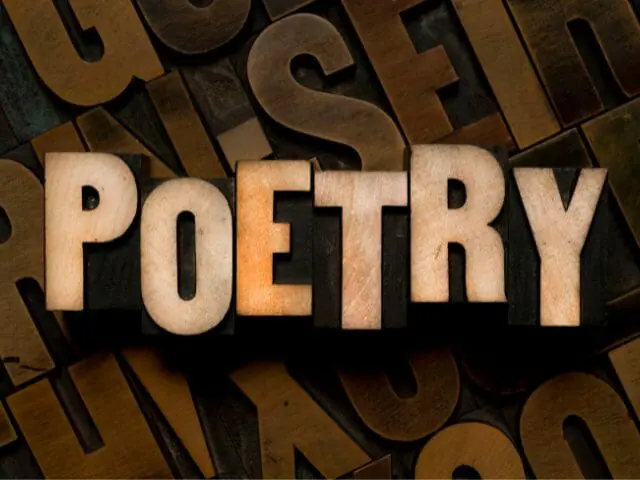
Poetry prompts are a great way to get your students to write creatively. These prompts will help your students tap into their imaginations and write poems that are both beautiful and moving. Whether in free verse or strict meter, your students will be sure to impress you with their poetic prowess.
41. Write about how you’re feeling right now in a haiku .
42. Create a poem in memory of a book, TV, or film character who has died.
43. Choose an onomatopoeia and use it five times in a poem.
44. Consider a metaphor for the current school year and create a poem about it.
45. Write a friendship poem in which every line includes a rhyme for “friend.”
Creative Writing Prompts

Last but not least, creative writing is all about using imagination to create a piece of writing that’s unlike anything else. This creative writing prompts will help your students tap into their imaginations and write some truly unique pieces revolving around self-expression.
46. If I could have any superpower, it would be…
47. Write about a day in the life of your favorite cartoon character.
48. If you could be a historical figure for a day, who would you choose to be?
49. Write a family story from the perspective of your pet.
50. Invent a new holiday and describe how it’s celebrated.
Jump In : Better prepare your 6th graders for this activity by improving their reading comprehension first! Proceed to read my list of fun comprehension exercises here — 11 Fun 6th Grade Reading Comprehension Activities (& Games) .
Dust Off Those Pencils and Get Ready to Write!
While many students lose motivation as their first middle school year goes on, these 50 6th grade writing prompts will help keep them excited about writing all year long. With tons of different genres and modes of writing to choose from, there’s something here for everyone! So get those pencils sharpened and those minds thinking—it’s time to start writing!
Last Updated on July 24, 2022 by Emily
- Pinterest 67
Emily is an active mother of two and a dedicated elementary school teacher. She believes the latest technology has made a huge impact on the quality of early learning and has worked hard to upgrade her classroom and her own children’s learning experience through technology.
Follow her on Twitter , Pinterest , and Instagram for more teaching fun!
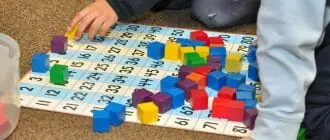
Save my name, email, and website in this browser for the next time I comment.
6th Grade Writing Prompts: Unlocking Imagination
By: Author Paul Jenkins
Posted on Published: March 27, 2023 - Last updated: July 31, 2023
Categories Writing
6th Grade Writing Prompts are a valuable tool for educators and parents alike, allowing young students to explore their thoughts, feelings, and ideas through creative writing exercises. These prompts can cover various topics, from personal experiences and emotions to thought-provoking scenarios and ethical dilemmas. The aim is to encourage students to think critically and express themselves effectively while developing their writing skills.
At this crucial stage of development, providing a supportive and engaging environment for students to practice and improve their writing abilities is vital. Numerous resources offer a wealth of compelling writing prompts specifically designed for 6th graders. The prompts you’ll find below in this article can inspire students to ponder real-world issues, reflect on their personal experiences, and imagine creative solutions to hypothetical situations.
The Importance of Writing Prompts
Writing prompts play a crucial role in developing the writing skills of 6th-grade students. They provide a starting point for students to begin expressing their thoughts and ideas, helping them overcome the common challenge of “writer’s block.” As students engage with various writing prompts, they learn to think critically, express their opinions, and dive into imaginative storytelling.
By offering a diverse range of topics, such as prompts that focus on procedural writing, students are exposed to different genres and styles of writing. This variety expands their writing horizons and helps them become well-rounded, versatile writers.
Introducing writing prompts at the 6th-grade level also enhances students’ analytical and problem-solving abilities. They learn to use evidence, logic, and reasoning to support their viewpoints and persuade readers. Additionally, writing prompts allow students to explore their creativity and foster a sense of self-discovery.
Lastly, engaging with writing prompts helps 6th graders develop crucial communication skills that serve as a foundation for future academic success and life experiences. Writing prompts encourage active participation in the learning process, promote self-expression, and cultivate a lifelong love for writing.
25 6th Grade Writing Prompts
- Imagine you’ve discovered a hidden door in your home that leads to a secret room. Describe the room and what you find inside.
- Write a story about a day when everyone’s dreams come true. How does this change the world?
- If you could switch lives with any historical figure for a day, who would you choose and why? Describe your day in their shoes.
- Imagine you have a time machine that can only be used once. Where and when would you go, and what would you do?
- Write a letter to your future self ten years from now. What advice would you give, and what questions would you ask?
- Create a new holiday and explain its celebration, including unique traditions or activities.
- Write an opinion essay on whether or not students should be required to wear uniforms in school. Provide reasons to support your argument.
- Imagine you can communicate with animals. What would you talk about, and which animal would you be most excited to speak with?
- Write a short story where the main character finds a mysterious map that leads to a hidden treasure.
- You’ve been chosen to represent Earth in an intergalactic council. What would you share about our planet and its inhabitants?
- Write a persuasive essay arguing for or against using technology in the classroom.
- Create a new superhero and describe their powers, backstory, and how they use their abilities for good.
- Imagine you are the president for a day. What would be your top priorities, and how would you address them?
- Write a story that starts with the sentence: “It was a dark and stormy night…”
- Create a fictional island and describe its geography, culture, and inhabitants. What makes this island unique?
- If you could invent a new gadget or tool to make life easier, what would it be, and how would it work?
- Write a personal narrative about a time when you faced a challenge and how you overcame it.
- Imagine you could create a new class or elective for your school. What would the class be about, and why would students benefit from it?
- Write a descriptive essay about your favorite place to visit. Use vivid sensory details to make the reader feel like they are with you.
- You wake up one day to find you’ve gained the ability to read minds. How do you use this power, and what challenges or moral dilemmas do you face?
- Create a fictional holiday and write a short story about a family celebrating it for the first time.
- Write a persuasive essay about the importance of conserving natural resources and the steps that should be taken to protect our environment.
- Imagine you are a detective solving a mysterious crime. Write a story that details your investigation and how you uncover the truth.
- If you could converse with any famous author, who would it be, and what would you ask them?
- Write a personal narrative about a memorable experience with a friend and what it taught you about friendship.
Understanding the 6th Grade Writing Curriculum
The transition from elementary to middle school.
As students enter 6th grade, they transition from elementary to middle school. This brings new challenges and expectations in their writing skills. They will be expected to write more complex content and use more sophisticated vocabulary. This includes writing for extended periods, such as long-term research or expressive pieces that may take a week, and writing for shorter durations in one sitting.
Emphasis on narrative writing
In 6th grade writing curriculum, there is a strong emphasis placed on narrative writing. This requires students to develop their storytelling abilities and write in a manner that engages the reader. They will focus on creating a clear narrative structure, developing characters, setting, and plot, and using vivid descriptive language to engage their audience.
Introduction to essay writing and personal narratives
Another vital part of the 6th grade writing curriculum is the introduction to essay writing and personal narratives. Students will learn how to effectively organize their thoughts and ideas coherently and logically. They will gain experience writing various essay types, such as persuasive, informative, and argumentative. Personal narratives will also play a key role, encouraging students to write about personal experiences and emotions and helping them build their voice and style as writers.
Role of reading comprehension and vocabulary development
Reading comprehension and vocabulary development are crucial in the 6th grade writing curriculum. Students must be able to understand complex texts, as this will inform their writing. Students will be exposed to new words and phrases to improve their vocabulary through reading assignments and class discussions. Building a strong vocabulary allows students to express their ideas more accurately and clearly, ultimately leading to more effective writing.
Types of 6th Grade Writing Prompts
Narrative prompts.
Narrative prompts encourage students to tell a story, real or imagined. These prompts can range from personal experiences to creating stories based on given scenarios. For example, a narrative prompt could be “Describe the hardest thing you have ever learned to do.”
Short Story Ideas
Short story ideas are prompts that invite students to create a fictional story with characters, settings, and a plot. These writing activities push students to develop their writing skills, storytelling abilities, and creativity. An example of a short story idea might be to “Write a story about a magical forest.”
Personal Narratives
Personal narrative prompts ask students to write about their own experiences or thoughts. These types of prompts encourage reflection, introspection, and the exploration of personal feelings. A personal narrative prompt might be “Write about a time you overcame a fear.”
Story Starters
Story starters are prompts that provide the beginning of a story, challenging students to continue and develop the narrative. They help spark students’ imaginations and encourage them to think creatively. For example, “In a world where animals could talk, a young girl made a surprising discovery…”
Descriptive Prompts
Descriptive writing prompts ask students to describe a specific object, place, or situation in detail, using vivid language and sensory details. This type of prompt helps students practice their creative writing and observation skills. An example of a descriptive prompt could be “Describe your dream vacation destination.”
Persuasive Prompts
Persuasive writing prompts require students to convince the reader of a particular opinion or point of view. Students practice building strong arguments, using evidence and facts, and addressing opposing viewpoints. An example of a persuasive prompt might be “Convince your readers why cell phones should or should not be allowed in school.”
Expository Prompts
Expository writing prompts ask students to explain, evaluate or analyze a topic, providing information and facts to support their position. This style of writing promotes critical thinking and research skills. A sample expository prompt might be “Explain the benefits and drawbacks of renewable energy sources.”
Creative Writing Prompts
Encourage your students to express their emotions and creativity through poetry. Here are some poetry prompts to inspire them:
- Write a poem about the changing seasons.
- Describe your favorite place using vivid imagery and sensory details.
- Compose a haiku about an everyday object.
- Create a poem from the perspective of an animal.
Imaginative Stories
Imagination is a powerful tool for developing writers. Provide these creative story prompts to spark their ideas:
- Write a story about a school where magic is real.
- Imagine you are a time-traveling scientist. Describe your adventures.
- Develop a story that revolves around a mysterious key.
- Create a tale where the main character’s best friend is a talking animal.
Scriptwriting
Scriptwriting can build dialogue and narrative skills. Suggest these engaging scriptwriting prompts for your students:
- Write a short script about two friends with a deep secret.
- Develop a scene featuring an unexpected encounter.
- Create a script that mixes elements of reality and fantasy.
- Compose a dialogue-rich scene set in a public place.
Using these creative writing prompt categories, 6th grade students can develop their writing abilities while letting their imagination soar.
Essay Writing Prompts
In this section, we explore a variety of essay writing prompts for 6th-grade students. These prompts are categorized under opinion essays, informative essays, and persuasive essays.
Opinion Essays
Opinion essays allow students to express their thoughts on a specific subject. Here are some prompts for 6th graders:
- What is your favorite hobby, and why?
- Which is better, traditional books or e-books? Explain your choice.
- What’s the best (or worst) birthday you’ve ever had?
- What is your greatest aspiration? Or, your darkest fear?
Informative Essays
Informative essays help students develop research and presentation skills. They should provide factual information about a topic. Here are some informative essay prompts:
- Describe your favorite short story in your own words.
- Write about the life cycle of a butterfly.
- Explain the process of photosynthesis in plants.
- Describe the history and importance of a famous landmark.
Persuasive Essays
Persuasive essays help students to develop their argumentative skills. They should present clear reasons and evidence to support their opinion. Here are some persuasive essay prompts:
- Should school uniforms be mandatory? Why or why not?
- Is it essential to learn a foreign language? Explain your view.
- Do video games have a positive or negative impact on children?
- Should students be allowed to use mobile phones in school? Provide reasons for your opinion.
Subject-Specific Prompts
Integrating subject-specific writing prompts can help students connect their writing skills to various subjects. This section will explore writing prompts for Language Arts, Science, Social Studies, Math, and Life Skills.
Language Arts
Language Arts writing prompts encourage students to analyze literature, express their thoughts, and improve their vocabulary. Examples include:
- Write a character analysis of the protagonist in your favorite book.
- Create a poem describing a historical event.
- Compose a short story inspired by a well-known myth.
Science writing prompts assist students in describing experiments, explaining scientific concepts, and making real-world connections. Examples include:
- Describe the steps of the water cycle and its importance to Earth.
- Explain the theory of evolution and provide examples of natural selection.
- Write about the role of technology in reducing the environmental impact of humans.
Social Studies
Social Studies writing prompts help students to explore historical events, cultural perspectives, and global issues. Examples include:
- Write an essay comparing the government systems of two countries.
- Discuss the significance of a famous historical figure’s actions.
- Analyze the impact of a specific geographical feature on human settlement.
Math writing prompts challenge students to apply mathematical concepts in various contexts and describe the logic behind problem-solving. Examples include:
- Explain how to solve a given math problem using the order of operations.
- Describe a real-world scenario where fractions are used and explain how to solve it.
- Discuss the role of geometry in architecture and provide examples.
Life Skills
Life Skills writing prompts encourage students to reflect on their personal experiences, goals, and values. Examples include:
- Write a letter to your future self, discussing the lessons you’ve learned and the goals you hope to accomplish.
- Discuss the importance of effective communication in relationships and provide examples.
- Explain the steps to achieving a specific personal goal and the challenges you may encounter.
Framework for Developing Prompts
When developing 6th grade writing prompts, balancing challenging and engaging topics is crucial. This allows students to explore new concepts while encouraging creativity and critical thinking. The framework presented in this section offers a few guiding principles for crafting effective prompts for this age group.
First, consider the interests and experiences of 6th grade students. Choosing topics related to their lives and what they care about will increase their motivation to write. For example, you might create prompts about the school, friendships, hobbies, or current events.
Next, design prompts that encourage a variety of writing genres, such as narrative, descriptive, expository, and persuasive. This helps students develop skills in different writing styles and formats. For example, a narrative prompt might ask students to tell a story about a memorable experience, while an expository prompt might ask them to explain how a particular invention works.
Ensure to include prompts requiring students to practice critical thinking and problem-solving. These prompts often involve solving a given situation, analyzing a topic, or comparing and contrasting ideas. This helps 6th graders develop analytical and evaluative skills essential for academic and personal success.
Lastly, incorporate opportunities for reflection and self-expression. Reflective prompts allow students to examine their feelings, beliefs, and ideas. For example, ask students to consider how they would handle a specific dilemma or what they appreciate most about their family or friends.
Following these guiding principles, you can create a diverse collection of 6th-grade writing prompts that encourage creativity, critical thinking, and self-expression.
Techniques to Engage Students
Creating meaningful and engaging writing prompts for sixth-grade students involves considering their interests, skills, and development stage. Several techniques can help achieve this.
First, one can use creative prompts to encourage students to think outside the box and express their unique perspectives. Some examples of creative writing prompts for sixth graders include writing a poem about feeling outraged or imagining a day from a cell phone’s perspective.
Next, incorporating argumentative and persuasive prompts can help students learn to articulate their opinions and support them with strong evidence. This is particularly useful in developing research and critical-thinking skills. Examples include writing a persuasive essay on a current issue or debating the merits of a controversial book or movie.
Another effective technique involves using real-world connections in prompts to make them more relevant and applicable to students’ lives. For instance, ask students to write about their first hospital experience or discuss how technology has impacted their daily routines.
Lastly, integrating different writing styles like narrative, expository, and descriptive prompts will allow students to experiment with various writing techniques and improve their writing skills. Examples include composing a personal narrative about overcoming a challenge, writing an expository essay on a historical event, or crafting a descriptive piece about a favorite place or object.
Assessing and Providing Feedback
One of the key aspects of 6th Grade Writing Prompts is the assessment and provision of constructive feedback to students. Assessing their writing skills helps teachers identify strengths and weaknesses and guide future instruction tailored to student needs.
When evaluating student writing, it’s essential to consider various aspects, such as content, organization, word choice, sentence structure, and grammar. Providing specific and actionable feedback allows students to improve their skills and better understand writing concepts.
A helpful approach for grading and feedback is to use rubrics. Rubrics offer a structured way to outline the expectations for a writing assignment and help students understand the evaluation criteria. There are different types of rubrics, such as analytic, holistic, grid, numeric, and hybrid, which can be customized to suit a variety of writing prompts.
Another strategy for providing effective feedback is ensuring students know the learning objectives and quality expectations for their writing assignments. Explicitly discussing the writing goals and criteria helps students focus their efforts and self-assess their progress.
Lastly, integrating student-teacher conferences or peer review sessions can benefit the feedback process. These sessions allow for dialogue, clarification, and additional insights from different perspectives.
Join my VIP teacher email club!

When I look back to my first experience teaching five paragraph essays to fifth graders, I can remember how terribly unprepared I felt.
I knew that the five paragraph essay format was what my students needed to help them pass our state’s writing assessment but I had no idea where to start.
I researched the few grade-appropriate essays I could find online (these were the days before Pinterest and Teachers Pay Teachers) and determined that there was a structure to follow.
Every essay followed the same basic structure. I taught the structure to my students and they did well.
I have been teaching five paragraph essay structure and everything that goes with it for several years now. I hope that after you read this blog post, you will have a good understanding of how to teach and grade five paragraph essays.
Once you’ve learned all about teaching basic essay structure, you’ll be ready to grow your writers from “blah” to brilliant!
Teaching five paragraph essays is just one part of teaching 5th grade writing. Click here to find out exactly how I teach writing to my 5th graders!

Start with Simple Paragraphs
We always start with simple paragraphs.
Yes, this is basic, but if your students cannot write excellent paragraphs, their five paragraph essays will be train wrecks. Trust me!
We spend a while cementing paragraph structure:
Topic Sentence
Closing Sentence
I give students topics, they come up with their own topics, we write together, they write with a partner or independently, the more variety, the better.
We have fun with simple paragraphs. Then, it’s time to move on to body paragraphs.

Organize and Write Body Paragraphs
Please refer to my five paragraph essay organizer below.
The three body paragraphs are absolutely crucial to the success of the five paragraph essay.
Some teachers have trouble teaching the structure of five paragraph essays because they start with the introduction paragraph.
Always teach the body paragraphs first!

I had a teacher say to me once, “What’s the point of just writing parts of the essay? They need to write the entire five paragraphs to get all of the practice they need.”
I understand that point. However, think of it as building a house. Should you test out the foundation and make sure it’s sound and sturdy before building on top of it? Absolutely! That’s what we’re doing here.
The three body paragraphs are the foundation of the essay.
Ask students to write out their three body paragraphs just like they have practiced…Topic sentence…Detail 1…Detail 2…Detail 3…Closing Sentence.
I “ooooh and aaaah” over their three paragraphs. Students are on their way to five paragraph essays, so be sure to build their confidence.

Teach the Introduction Paragraph
I have to say, this is my favorite paragraph to teach. The introduction paragraph is what draws readers into the essay and makes them want to read more.
We start with what I call a “hook.” The hook captures the readers’ attention and can come in many forms: asking a question, making a bold statement, sharing a memory, etc.
After the hook, I ask students to add a sentence or two of applicable commentary about the hook or about the prompt in general.
Finally, we add the thesis sentence. The thesis sentence always follows the same formula: Restate the prompt, topic 1, topic 2, and topic 3.
That’s all you need to write an excellent introduction paragraph!
I do suggest having students write the introduction paragraph plus body paragraphs a couple of times before teaching the closing paragraph.

Teach the Closing Paragraph
In the conclusion paragraph, we mainly focus on restating the thesis and including an engaging closing thought.
With my students, I use the analogy of a gift.
The introduction paragraph and body paragraphs are the gift and the conclusion paragraph is the ribbon that ties everything together and finishes the package.
When you talk about restating the thesis sentence, tell students that they need to make it sound different enough from their original thesis sentence to save their readers from boredom.
Who wants to read the same thing twice? No one!
Students can change up the format and wording a bit to make it fresh.
I enjoy teaching the closing thought because it’s so open to however students want to create it.
Ways to write the closing thought: ask a question, personal statement, call to action, or even a quote.
I especially like reading the essays in which a quote is used as a closing thought or a powerful statement is used.

Example of a full five paragraph essay
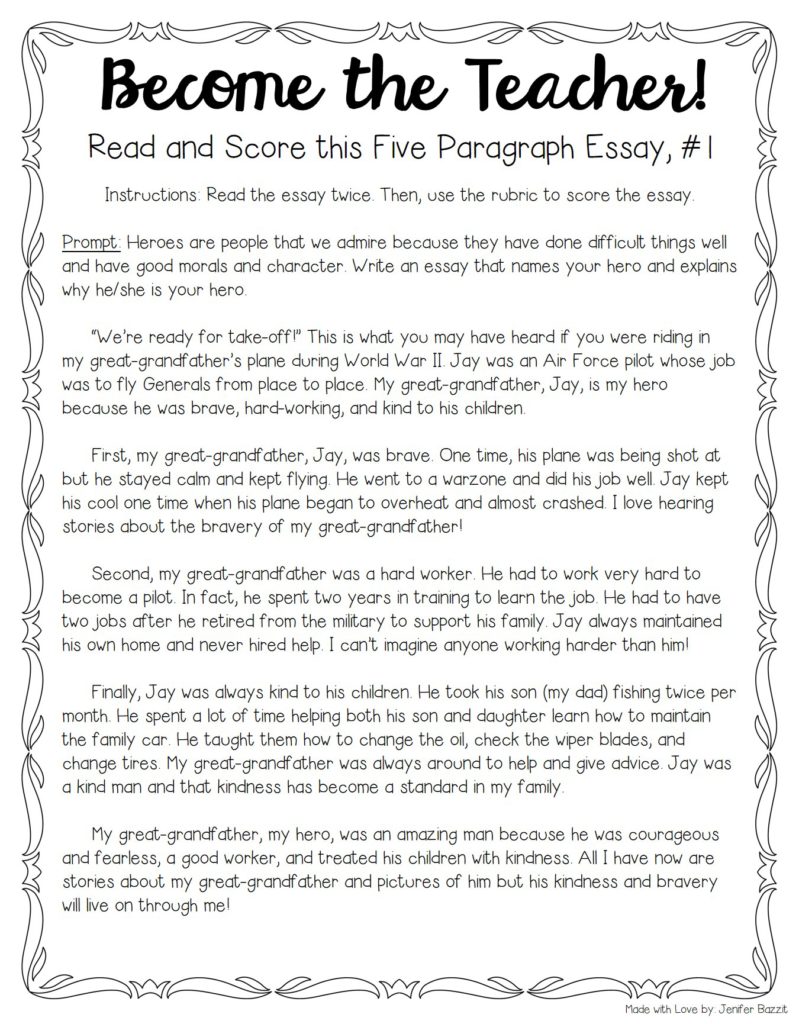
Let’s Talk About Color-Coding!
Who doesn’t like to color? This is coloring with a purpose!
Training your students to color-code their paragraphs and essays will make grading so much easier and will provide reminders and reinforcements for students.
When students color-code their writing, they must think about the parts of their paragraphs, like topic sentences, details, and the closing sentence.
They will be able to see if they are missing something or if they’ve written something out of order.
Color-coding is a wonderful help for the teacher because you can skim to ensure that all parts of your students’ paragraphs and essays are present.
Also, when you are grading, you can quickly scan the paragraphs and essays. Trust me, you will develop a quick essay-grading ability.
I start color-coding with my students at the very beginning when they are working on simple paragraphs. I add the additional elements of the color-code as we progress through our five paragraph essays.
This is the code that I use:

Let’s Talk About Grading Five Paragraph Essays!
Imagine a lonely, stressed teacher grading five paragraph essays on the couch while her husband is working the night shift.
That was me!
Seriously, guys, I would spend about ten minutes per essay. I marked every little error, I made notes for improvement and notes of encouragement. I reworked their incorrect structure.
Those papers were full of marks.
On Monday, I proudly brought back the essays and asked students to look over them and learn what they needed to fix for next time.
You can guess what happened… there were lots of graded essays in the trashcan at the end of the day.

I decided that my grading practices had to change. I needed my weekends back and my students needed to find their own errors!
This is my best advice:
STOP correcting every error!
Your students are not benefiting from marks all over their writing. They need to find those errors themselves so that they will remember their mistakes and change their writing habits.
Do a quick scan of each student’s writing as soon as it’s turned in to you.
If there are major problems with a student’s writing, call him/her over individually and show him/her what needs to be fixed or put the student with a competent peer editor who will help them fix mistakes.
If you have several students who are struggling with a skill, like closing sentences, do a mini-lesson on this topic.
You can do a mini-lesson with a small group. However, I prefer doing mini-lessons with the entire class. The kids who need help will get it and the rest of your class will receive a refresher.
It’s OK if there are some small spelling/grammar mistakes!
If the errors are few and they don’t take away from the meaning/flow of the essay, I don’t worry about them.
Our students are still learning.
Even your brightest star writer will have a few spelling/grammar mistakes from time to time.
Don’t discourage students from writing because of small errors.
Students who receive papers back with markings all over them don’t think, “Oh boy, my teacher has made it so easy for me to make all of these corrections.” They are thinking, “What’s the point in writing? I must be a terrible writer. Look at all of these mistakes.”
If your students are taking a standardized writing assessment, the structure and flow of their essays will be worth much more than perfect spelling.
Need more help?
I created this five paragraph essay instructional unit for teachers who are new to teaching five paragraph essays OR just need all of the materials in one place.
“Teacher Talk” pages will guide you through the unit and this unit contains all materials needed to help students plan, organize, and write amazing five paragraph essays! Click here to check it out:

I have a freebie for you! Enter your first name and email address below. You’ll receive three original prompts with five paragraph essay organizers AND two lined final draft pages!
Once your students are good essay writers…
These task cards will help your students stay sharp on their five paragraph essay knowledge. Students will review hooks (attention-getters), thesis sentences, body paragraphs, topic sentences, closings, and more. Each card contains a unique writing example!
I suggest using these task cards as a quiz/test, scoot game, individual review, or cooperative group activity.
Click on the image to view these task cards:

To save this post for later, simply pin this image to your teacher Pinterest board!
21 comments.
Wow! I really enjoyed reading this. I’ve always stressed over the thought of teaching writing, but your blog makes me think I can do it successfully. Putting your writing packet on my TPT wish list!
Thank you, Shannon! I appreciate you taking the time to leave a comment. I am so glad that my blog post was helpful to you!
Thanks for the tips! When I taught 6th grade I taught this same subject matter, but struggled to get started. I wish I had this then!
I appreciate your comment! Teaching was much different before Pinterest, wasn’t it?!?
This helped me so much!🙂 thanks a lot, I imagined being one student of yours. I’d be so smart and good at essays! Would’ve been so much easier in person❤️❤️❤️
Thank you so much, Aizlyn!
Thank you so much for this! May I ask where I can see the rubric for scoring the compositions?
You are so welcome! Click on the resource link. Then, you will see the rubric in the preview!
Thank you so much,I am a parent and this really helped me be clear how to guide my son. God bless you always.,
Thanks for taking the time to leave a comment!
you are welcome!!!
This looks great! Looking forward to using your tips and freebies with my 6th graders. 🙂 THANK YOU.
You are so welcome! Thank you for taking the time to leave a comment!
Can’t wait to use this with my class tomorrow! Thanks a bunch for sharing!!
You are so welcome, Amy!
Thank you for making it easy to teach an essay with clarity.
You are very welcome, Yamuna! Thanks for taking the time to leave feedback 🙂
I am so happy I discovered your blog. I just started teaching grade 5 in September I have been searching for a simple method to hel me in guiding them in writing. I will be putting your method into practice in the coming week.
That’s wonderful, Cherry! Thank you for sharing your thoughts! Welcome to fifth grade 🙂
Beautiful lesson well explained! Thank you so very much .
Thank you so much, Cheryl!
Leave a Reply Cancel reply
Your email address will not be published. Required fields are marked *
Notify me of follow-up comments by email.
Notify me of new posts by email.
This site uses Akismet to reduce spam. Learn how your comment data is processed .
You may also enjoy...

A message to the teacher-mom who doesn’t want Winter Break to end…

The Step-By-Step Guide to Teaching Research Reports

History Hashtag Fan Club – A Fun, Easy Review Idea

5 Helpful Tips for Struggling Social Studies Teachers

Big List of Social Studies Journal Prompts – A Growing List

How to Make Your Social Studies Lessons Come to Life for Students
What can i help you teach, find it here, let's connect, i'd love to connect with you.
Enter your first name and email address to join my exclusive VIP email club.
Copyright © 2020 | Thrive in Grade Five | All Rights Reserved
Quick Links
Writing Ideas
- Beginning a compare&contrast paper
- Strong persuasive paper topics
- Response to literature essay samples
- Finding an essay topic on Israel
Composing An Excellent 6th Grade Narrative Essay
The best way to describe a narrative is that it tells a story. They can be made up of anecdotes, personal experience or someone else’s experience. Usually for students of the 6th grade level, the narrative essay is meant to be a personal narrative. The purpose is two-fold: to get the student thinking and to give the student experience in writing papers.
Characteristics of a Narrative Essay
- Tells all parts of a story, giving enough detail for the reader to come to an understanding of the purpose
- Should be written clearly from an obvious point of view
- Should be an expression and creative display of the student’s writing
- The use of first person is accepted
Where to Begin Writing
A 6th grader may need a detailed step-by-step plan to follow in order to accomplish this essay. This will help them stay on track and not forget any of the essential parts. Here is a plan to follow in writing a personal narrative:
- Choose a good topic. This would be based on something from the student’s life. The essay will not only tell the story of what happened, it will also include the student’s analysis of the story.
- Should highlight the writer’s creative skills in story-telling.
- Should be able to help the reader connect in some way, to their own life experiences.
- If given a prompt, the topic must fit the prompt. For example, it may be about a hardship that had to be overcome, or a way your life was changed, or something that made you view life on a different level.
- Make sure the plot is manageable. It shouldn’t be something too long with many separate events involved. It should be narrowed down sufficiently.
- Limit the number of characters or people who are introduced into the paper, so it doesn’t get bogged down with too many people.
- The paper should exhibit vibrant details and yet give just enough room for the reader to use their imagination to fill in some of the gaps.
- Stay as true to the original story as possible. Most personal narrative papers are meant to be non-fiction.
- Make an outline of your school work and then use details and description to fill in each paragraph.
- Briefly describe important characters. Identify antagonists and protagonists if necessary.
- Describe the setting using vivid details.
- Proofread and revise your essay.
“ Every writer, no matter how good he is with his first attempt should proofread his paper. ” – Donna Brians
This resource changes all old-fashioned cliches and boring techniques into new and original ways of writing. Like to come here for fresh ideas!
Never thought writing can be so captivating! Thank you for helping me every time I need!
Writing Partners

Popular Tips
- Creating a perfect paper
- Essay on capital punishment
- Finding an essay writing company
- Where to buy an essay without troubles
- Election 2024
- Entertainment
- Newsletters
- Photography
- Personal Finance
- AP Investigations
- AP Buyline Personal Finance
- Press Releases
- Israel-Hamas War
- Russia-Ukraine War
- Global elections
- Asia Pacific
- Latin America
- Middle East
- Election Results
- Delegate Tracker
- AP & Elections
- March Madness
- AP Top 25 Poll
- Movie reviews
- Book reviews
- Personal finance
- Financial Markets
- Business Highlights
- Financial wellness
- Artificial Intelligence
- Social Media
Should college essays touch on race? Some feel the affirmative action ruling leaves them no choice
Hillary Amofa listens to others member of the Lincoln Park High School step team after school Friday, March 8, 2024, in Chicago. (AP Photo/Charles Rex Arbogast)

When the Supreme Court ended affirmative action, it left the college essay as one of few places where race can play a role in admissions decisions. (AP Video: Noreen Nasir)
Hillary Amofa listens to others member of the Lincoln Park High School step team after school Friday, March 8, 2024, in Chicago. When she started writing her college essay, Amofa told the story she thought admissions offices wanted to hear. She wrote about being the daughter of immigrants from Ghana, about growing up in a small apartment in Chicago. She described hardship and struggle. Then she deleted it all. “I would just find myself kind of trauma-dumping,” said the 18 year-old senior, “And I’m just like, this doesn’t really say anything about me as a person.” (AP Photo/Charles Rex Arbogast)
- Copy Link copied
Hillary Amofa, laughs as she participates in a team building game with members of the Lincoln Park High School step team after school Friday, March 8, 2024, in Chicago. When she started writing her college essay, Amofa told the story she thought admissions offices wanted to hear. She wrote about being the daughter of immigrants from Ghana, about growing up in a small apartment in Chicago. She described hardship and struggle. Then she deleted it all. “I would just find myself kind of trauma-dumping,” said the 18 year-old senior, “And I’m just like, this doesn’t really say anything about me as a person.” (AP Photo/Charles Rex Arbogast)
Hillary Amofa stands for a portrait after practice with members of the Lincoln Park High School step team Friday, March 8, 2024, in Chicago. When she started writing her college essay, Amofa told the story she thought admissions offices wanted to hear. She wrote about being the daughter of immigrants from Ghana, about growing up in a small apartment in Chicago. She described hardship and struggle. Then she deleted it all. “I would just find myself kind of trauma-dumping,” said the 18 year-old senior, “And I’m just like, this doesn’t really say anything about me as a person.” (AP Photo/Charles Rex Arbogast)
Max Decker, a senior at Lincoln High School, sits for a portrait in the school library where he often worked on writing his college essays, in Portland, Ore., Wednesday, March 20, 2024. (AP Photo/Amanda Loman)
Hillary Amofa stands for a portrait after practice with members of the Lincoln Park High School step team Friday, March 8, 2024, in Chicago. When she started writing her college essay, Amofa told the story she thought admissions offices wanted to hear. She wrote about being the daughter of immigrants from Ghana, about growing up in a small apartment in Chicago. (AP Photo/Charles Rex Arbogast)
Hillary Amofa, second from left, practices with members of the Lincoln Park High School step team after school Friday, March 8, 2024, in Chicago. When she started writing her college essay, Amofa told the story she thought admissions offices wanted to hear. She wrote about being the daughter of immigrants from Ghana, about growing up in a small apartment in Chicago. She described hardship and struggle. Then she deleted it all. “I would just find myself kind of trauma-dumping,” said the 18 year-old senior, “And I’m just like, this doesn’t really say anything about me as a person.” (AP Photo/Charles Rex Arbogast)
Max Decker, a senior at Lincoln High School, stands for a portrait outside of the school in Portland, Ore., Wednesday, March 20, 2024. (AP Photo/Amanda Loman)
*Hillary Amofa, reflected right, practices in a mirror with members of the Lincoln Park High School step team after school Friday, March 8, 2024, in Chicago. When she started writing her college essay, Amofa told the story she thought admissions offices wanted to hear. She wrote about being the daughter of immigrants from Ghana, about growing up in a small apartment in Chicago. She described hardship and struggle. Then she deleted it all. “I would just find myself kind of trauma-dumping,” said the 18 year-old senior, “And I’m just like, this doesn’t really say anything about me as a person.” (AP Photo/Charles Rex Arbogast)
Max Decker, a senior at Lincoln High School, sits for a portrait outside of the school in Portland, Ore., Wednesday, March 20, 2024. (AP Photo/Amanda Loman)
Hillary Amofa, left, practices with members of the Lincoln Park High School step team after school Friday, March 8, 2024, in Chicago. When she started writing her college essay, Amofa told the story she thought admissions offices wanted to hear. She wrote about being the daughter of immigrants from Ghana, about growing up in a small apartment in Chicago. She described hardship and struggle. Then she deleted it all. “I would just find myself kind of trauma-dumping,” said the 18 year-old senior, “And I’m just like, this doesn’t really say anything about me as a person.” (AP Photo/Charles Rex Arbogast)
Hillary Amofa sits for a portrait after her step team practice at Lincoln Park High School Friday, March 8, 2024, in Chicago. When she started writing her college essay, Amofa told the story she thought admissions offices wanted to hear. She wrote about being the daughter of immigrants from Ghana, about growing up in a small apartment in Chicago. She described hardship and struggle. Then she deleted it all. “I would just find myself kind of trauma-dumping,” said the 18 year-old senior, “And I’m just like, this doesn’t really say anything about me as a person.” (AP Photo/Charles Rex Arbogast)
FILE - Demonstrators protest outside of the Supreme Court in Washington, in this June 29, 2023 file photo, after the Supreme Court struck down affirmative action in college admissions, saying race cannot be a factor. (AP Photo/Jose Luis Magana)
CHICAGO (AP) — When she started writing her college essay, Hillary Amofa told the story she thought admissions offices wanted to hear. About being the daughter of immigrants from Ghana and growing up in a small apartment in Chicago. About hardship and struggle.
Then she deleted it all.
“I would just find myself kind of trauma-dumping,” said the 18-year-old senior at Lincoln Park High School in Chicago. “And I’m just like, this doesn’t really say anything about me as a person.”
When the Supreme Court ended affirmative action in higher education, it left the college essay as one of few places where race can play a role in admissions decisions. For many students of color, instantly more was riding on the already high-stakes writing assignment. Some say they felt pressure to exploit their hardships as they competed for a spot on campus.
Amofa was just starting to think about her essay when the court issued its decision, and it left her with a wave of questions. Could she still write about her race? Could she be penalized for it? She wanted to tell colleges about her heritage but she didn’t want to be defined by it.
In English class, Amofa and her classmates read sample essays that all seemed to focus on some trauma or hardship. It left her with the impression she had to write about her life’s hardest moments to show how far she’d come. But she and some of her classmates wondered if their lives had been hard enough to catch the attention of admissions offices.
“For a lot of students, there’s a feeling of, like, having to go through something so horrible to feel worthy of going to school, which is kind of sad,” said Amofa, the daughter of a hospital technician and an Uber driver.
This year’s senior class is the first in decades to navigate college admissions without affirmative action . The Supreme Court upheld the practice in decisions going back to the 1970s, but this court’s conservative supermajority found it is unconstitutional for colleges to give students extra weight because of their race alone.
Still, the decision left room for race to play an indirect role: Chief Justice John Roberts wrote universities can still consider how an applicant’s life was shaped by their race, “so long as that discussion is concretely tied to a quality of character or unique ability.”
“A benefit to a student who overcame racial discrimination, for example, must be tied to that student’s courage and determination,” he wrote.
Scores of colleges responded with new essay prompts asking about students’ backgrounds. Brown University asked applicants how “an aspect of your growing up has inspired or challenged you.” Rice University asked students how their perspectives were shaped by their “background, experiences, upbringing, and/or racial identity.”
Hillary Amofa, reflected right, practices in a mirror with members of the Lincoln Park High School step team after school, March 8, 2024, in Chicago. (AP Photo/Charles Rex Arbogast)
WONDERING IF SCHOOLS ‘EXPECT A SOB STORY’
When Darrian Merritt started writing his essay, he knew the stakes were higher than ever because of the court’s decision. His first instinct was to write about events that led to him going to live with his grandmother as a child.
Those were painful memories, but he thought they might play well at schools like Yale, Stanford and Vanderbilt.
“I feel like the admissions committee might expect a sob story or a tragic story,” said Merritt, a senior in Cleveland. “And if you don’t provide that, then maybe they’re not going to feel like you went through enough to deserve having a spot at the university. I wrestled with that a lot.”
He wrote drafts focusing on his childhood, but it never amounted to more than a collection of memories. Eventually he abandoned the idea and aimed for an essay that would stand out for its positivity.
Merritt wrote about a summer camp where he started to feel more comfortable in his own skin. He described embracing his personality and defying his tendency to please others. The essay had humor — it centered on a water gun fight where he had victory in sight but, in a comedic twist, slipped and fell. But the essay also reflects on his feelings of not being “Black enough” and getting made fun of for listening to “white people music.”
“I was like, ‘OK, I’m going to write this for me, and we’re just going to see how it goes,’” he said. “It just felt real, and it felt like an honest story.”
The essay describes a breakthrough as he learned “to take ownership of myself and my future by sharing my true personality with the people I encounter. ... I realized that the first chapter of my own story had just been written.”
Max Decker, a senior at Lincoln High School, sits for a portrait in the school library where he often worked on writing his college essays, in Portland, Ore., March 20, 2024. (AP Photo/Amanda Loman)
A RULING PROMPTS PIVOTS ON ESSAY TOPICS
Like many students, Max Decker of Portland, Oregon, had drafted a college essay on one topic, only to change direction after the Supreme Court ruling in June.
Decker initially wrote about his love for video games. In a childhood surrounded by constant change, navigating his parents’ divorce, the games he took from place to place on his Nintendo DS were a source of comfort.
But the essay he submitted to colleges focused on the community he found through Word is Bond, a leadership group for young Black men in Portland.
As the only biracial, Jewish kid with divorced parents in a predominantly white, Christian community, Decker wrote he constantly felt like the odd one out. On a trip with Word is Bond to Capitol Hill, he and friends who looked just like him shook hands with lawmakers. The experience, he wrote, changed how he saw himself.
“It’s because I’m different that I provide something precious to the world, not the other way around,” he wrote.
As a first-generation college student, Decker thought about the subtle ways his peers seemed to know more about navigating the admissions process . They made sure to get into advanced classes at the start of high school, and they knew how to secure glowing letters of recommendation.
Max Decker reads his college essay on his experience with a leadership group for young Black men. (AP Video/Noreen Nasir)
If writing about race would give him a slight edge and show admissions officers a fuller picture of his achievements, he wanted to take that small advantage.
His first memory about race, Decker said, was when he went to get a haircut in elementary school and the barber made rude comments about his curly hair. Until recently, the insecurity that moment created led him to keep his hair buzzed short.
Through Word is Bond, Decker said he found a space to explore his identity as a Black man. It was one of the first times he was surrounded by Black peers and saw Black role models. It filled him with a sense of pride in his identity. No more buzzcut.
The pressure to write about race involved a tradeoff with other important things in his life, Decker said. That included his passion for journalism, like the piece he wrote on efforts to revive a once-thriving Black neighborhood in Portland. In the end, he squeezed in 100 characters about his journalism under the application’s activities section.
“My final essay, it felt true to myself. But the difference between that and my other essay was the fact that it wasn’t the truth that I necessarily wanted to share,” said Decker, whose top college choice is Tulane, in New Orleans, because of the region’s diversity. “It felt like I just had to limit the truth I was sharing to what I feel like the world is expecting of me.”
Demonstrators protest outside of the Supreme Court in Washington, in this June 29, 2023 file photo, after the Supreme Court struck down affirmative action in college admissions, saying race cannot be a factor. (AP Photo/Jose Luis Magana)
SPELLING OUT THE IMPACT OF RACE
Before the Supreme Court ruling, it seemed a given to Imani Laird that colleges would consider the ways that race had touched her life. But now, she felt like she had to spell it out.
As she started her essay, she reflected on how she had faced bias or felt overlooked as a Black student in predominantly white spaces.
There was the year in math class when the teacher kept calling her by the name of another Black student. There were the comments that she’d have an easier time getting into college because she was Black .
“I didn’t have it easier because of my race,” said Laird, a senior at Newton South High School in the Boston suburbs who was accepted at Wellesley and Howard University, and is waiting to hear from several Ivy League colleges. “I had stuff I had to overcome.”
In her final essays, she wrote about her grandfather, who served in the military but was denied access to GI Bill benefits because of his race.
She described how discrimination fueled her ambition to excel and pursue a career in public policy.
“So, I never settled for mediocrity,” she wrote. “Regardless of the subject, my goal in class was not just to participate but to excel. Beyond academics, I wanted to excel while remembering what started this motivation in the first place.”
Hillary Amofa stands for a portrait after practice with members of the Lincoln Park High School step team, March 8, 2024, in Chicago. (AP Photo/Charles Rex Arbogast)
WILL SCHOOLS LOSE RACIAL DIVERSITY?
Amofa used to think affirmative action was only a factor at schools like Harvard and Yale. After the court’s ruling, she was surprised to find that race was taken into account even at some public universities she was applying to.
Now, without affirmative action, she wondered if mostly white schools will become even whiter.
It’s been on her mind as she chooses between Indiana University and the University of Dayton, both of which have relatively few Black students. When she was one of the only Black students in her grade school, she could fall back on her family and Ghanaian friends at church. At college, she worries about loneliness.
“That’s what I’m nervous about,” she said. “Going and just feeling so isolated, even though I’m constantly around people.”
Hillary Amofa reads her college essay on embracing her natural hair. (AP Video/Noreen Nasir)
The first drafts of her essay focused on growing up in a low-income family, sharing a bedroom with her brother and grandmother. But it didn’t tell colleges about who she is now, she said.
Her final essay tells how she came to embrace her natural hair . She wrote about going to a mostly white grade school where classmates made jokes about her afro. When her grandmother sent her back with braids or cornrows, they made fun of those too.
Over time, she ignored their insults and found beauty in the styles worn by women in her life. She now runs a business doing braids and other hairstyles in her neighborhood.
“I stopped seeing myself through the lens of the European traditional beauty standards and started seeing myself through the lens that I created,” Amofa wrote.
“Criticism will persist, but it loses its power when you know there’s a crown on your head!”
Ma reported from Portland, Oregon.
The Associated Press’ education coverage receives financial support from multiple private foundations. AP is solely responsible for all content. Find AP’s standards for working with philanthropies, a list of supporters and funded coverage areas at AP.org .

- Grades 6-12
- School Leaders
FREE Poetry Worksheet Bundle! Perfect for National Poetry Month.
80 Intriguing Compare and Contrast Essay Topics for Kids and Teens
Android vs. iPhone? Capitalism vs. communism? Hot dog vs. taco?
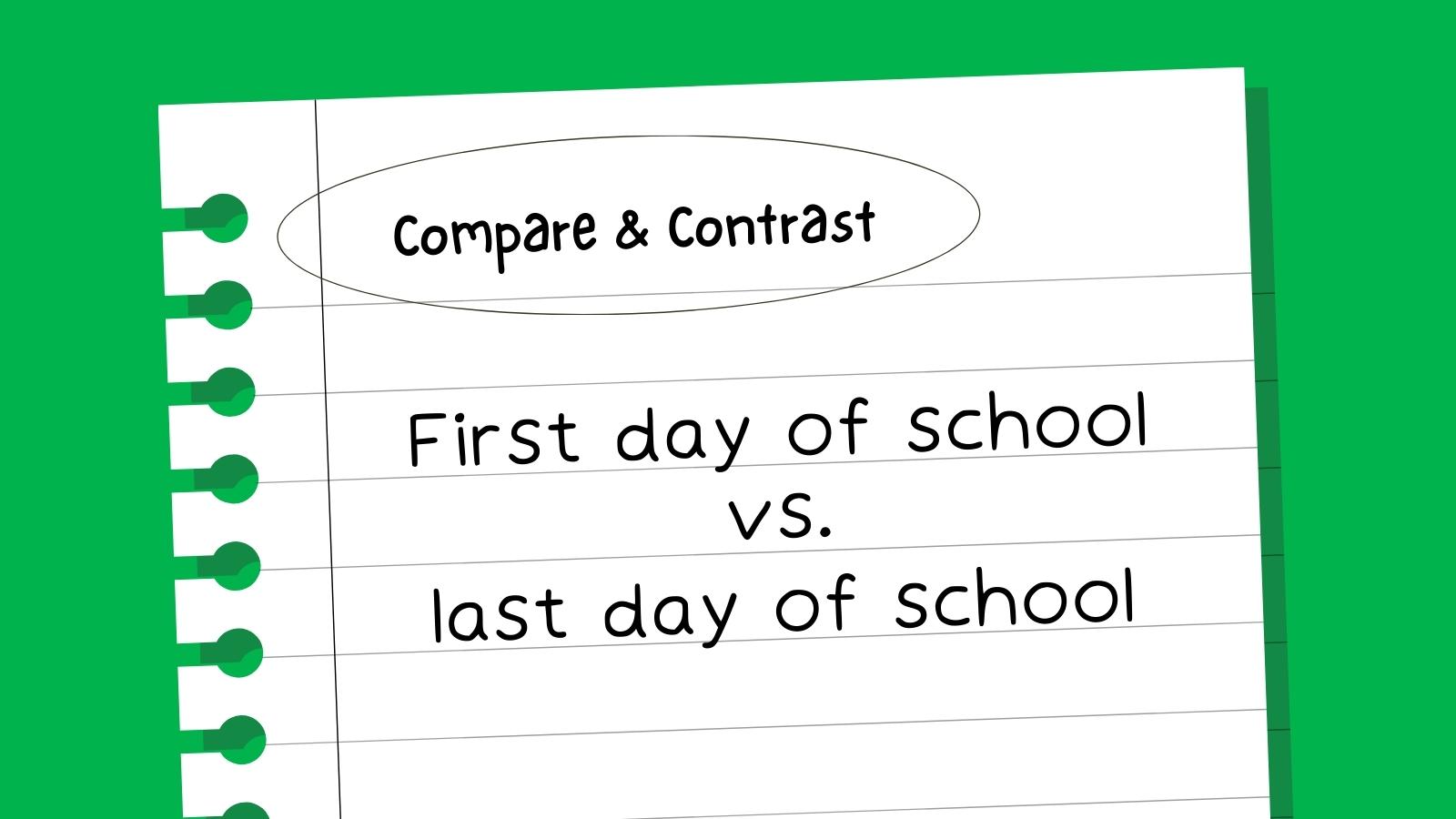
In compare and contrast essays , writers show the similarities and differences between two things. They combine descriptive writing with analysis, making connections and showing dissimilarities. Remind students that in this type of writing, they’re not necessarily trying to sway the reader to one opinion or another—they’re just presenting and analyzing facts. These compare and contrast essay topics will give them plenty of practice.
- School and Life Essay Topics
- Entertainment Essay Topics
- History and Politics Essay Topics
- Just for Fun Essay Topics
School and Life Compare and Contrast Essay Topics
- Public and private schools
- Online school and in-person school
- Any two schools or colleges
- Going to college vs. starting work full-time
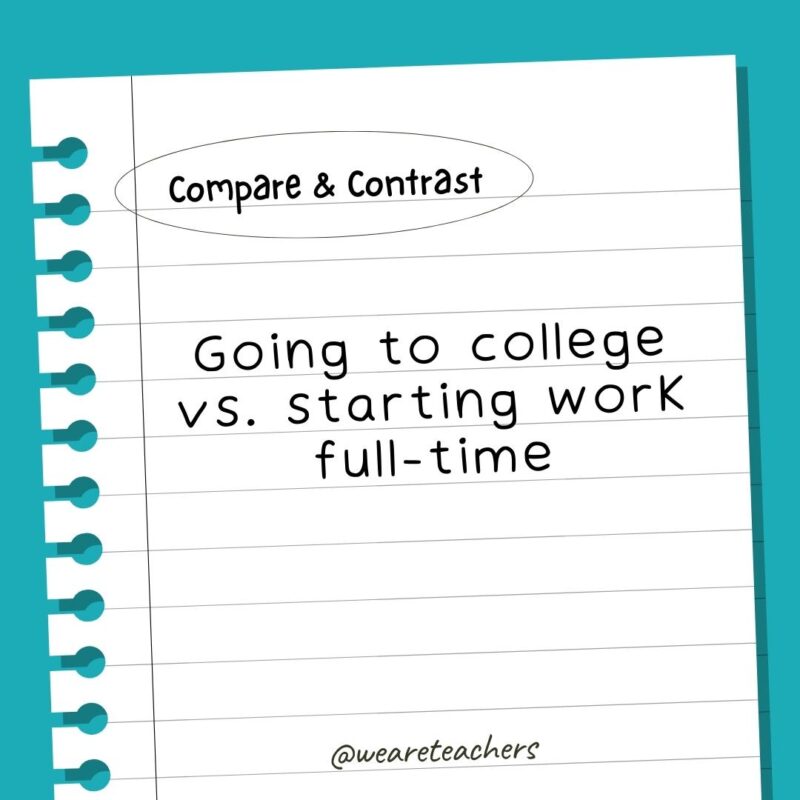
- Working your way through college as you go or taking out student loans
- Parents and grandparents
- Elementary school and high school
- Learning to read vs. learning to write
- The importance of any two school subjects
- Wearing glasses vs. having braces
- You and your best friend
- Friendship vs. romantic love
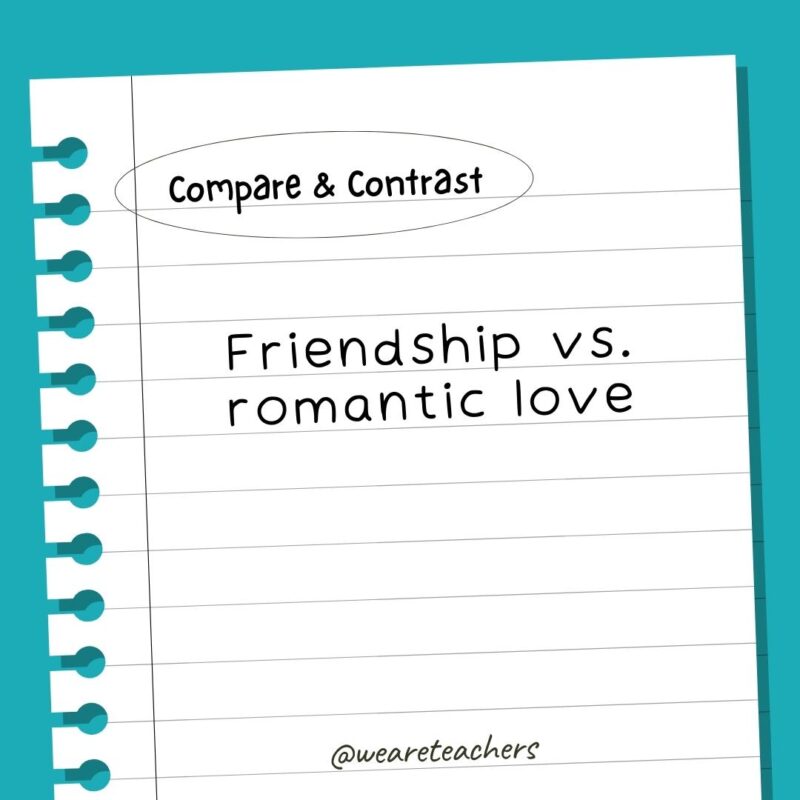
- Group work and individual work
- Only child vs. having siblings
- Nature vs. nurture
- Anxiety and depression
- Old friends and new friends
- Your teacher vs. your parent/guardian
- Car ownership and public transportation
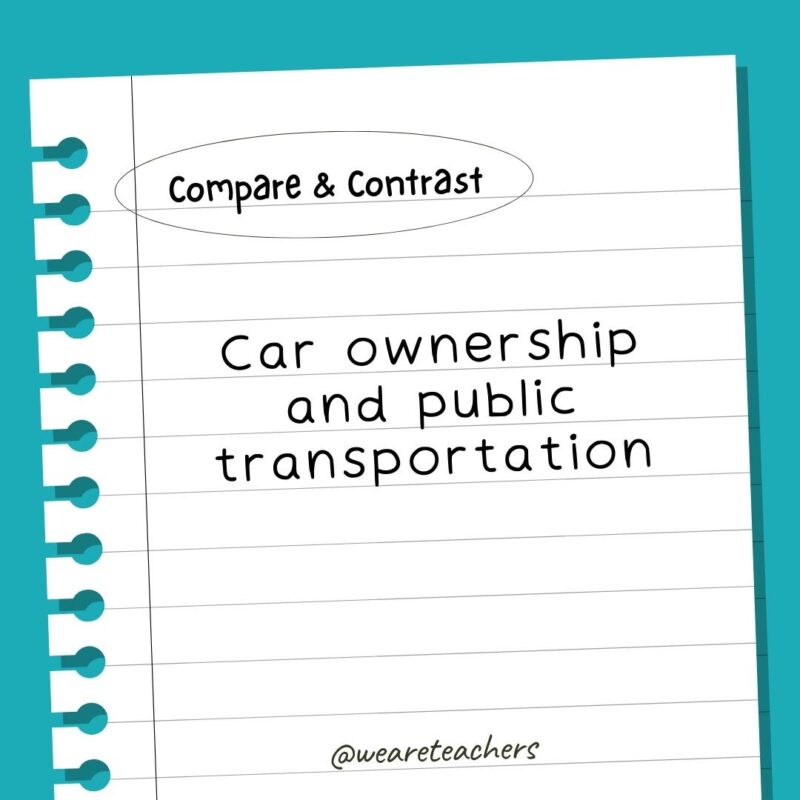
- Learning to ride a bike vs. learning to drive a car
Entertainment Compare and Contrast Essay Topics
- iPhone vs. Android
- Instagram vs. Twitter (or choose any other two social media platforms)
- Xbox vs. PlayStation
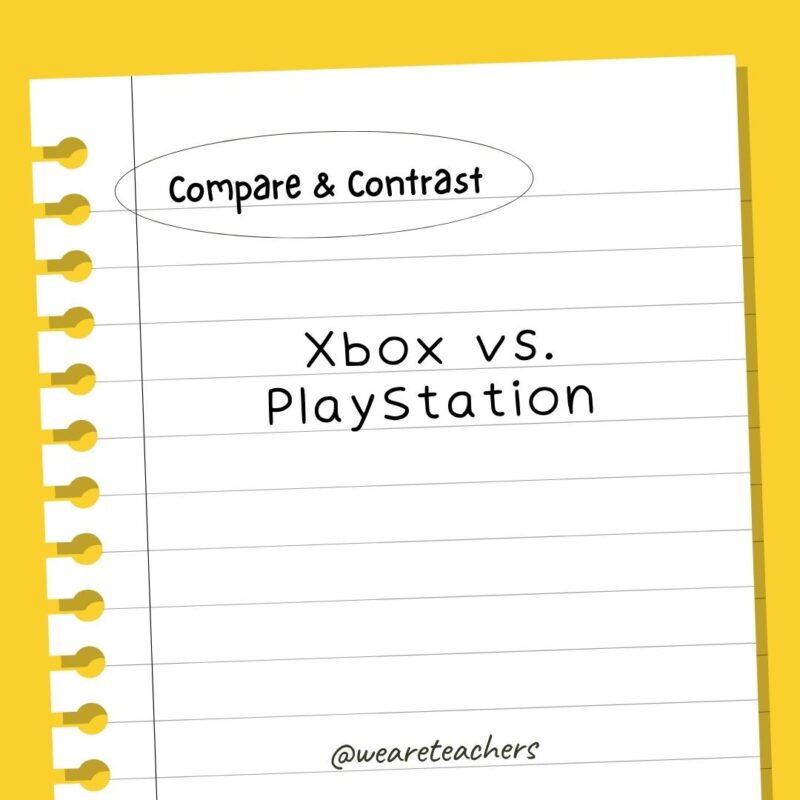
- Any two sports, like American football vs. soccer
- Cooking at home and dining out
- A movie based on a book and the book it was based on
- Reading and watching TV
- Opera music and pop music (or any two music genres)
- Vegetarian and vegan
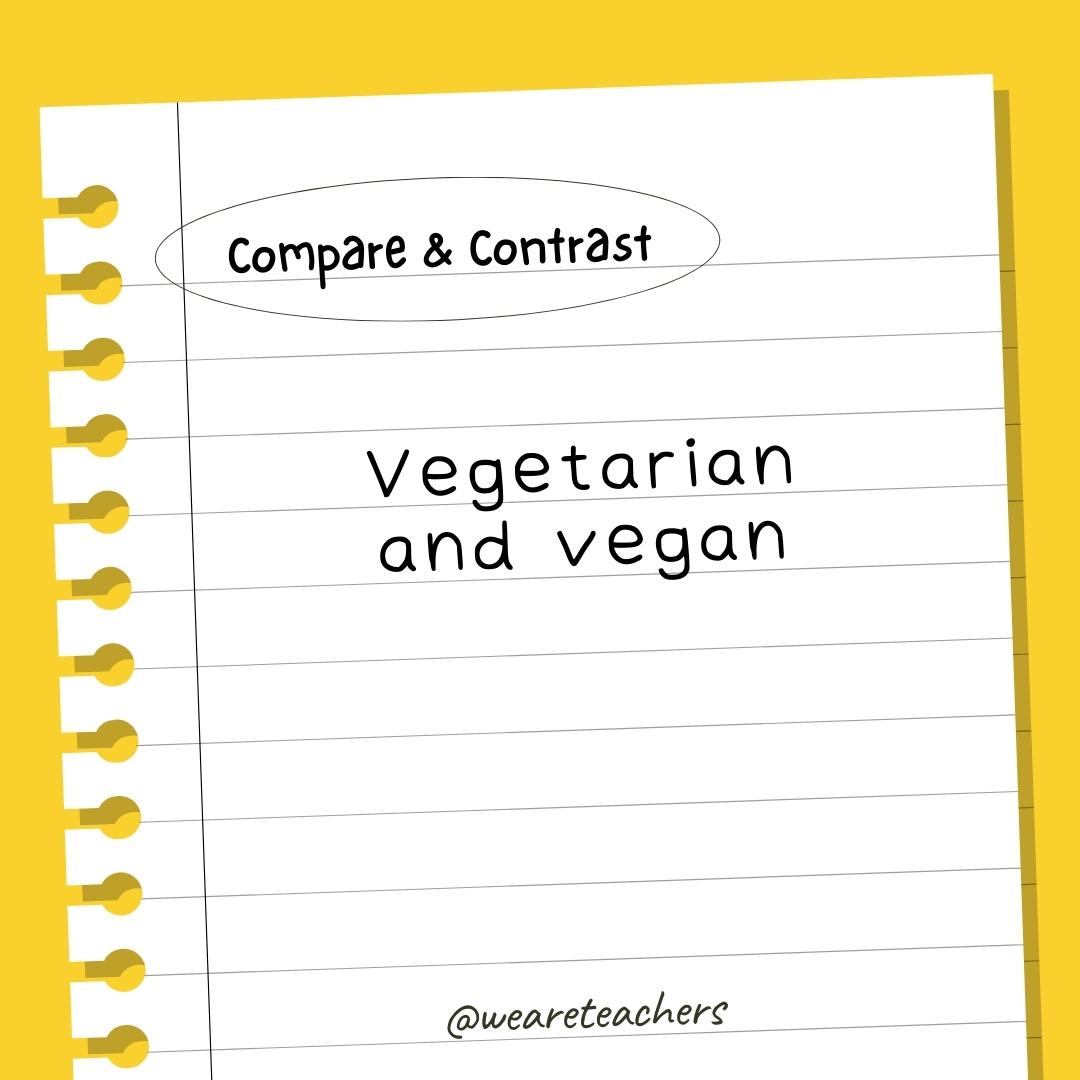
- Giving and receiving gifts
- Going to a play vs. going to a movie
- Playing a video game and watching a movie
- Horse racing vs. NASCAR
- Laptop vs. tablet
- Sprint vs. marathon
- Poetry and rap music
- Ping-Pong vs. tennis
- DC vs. Marvel
- Netflix and YouTube
- Shopping online and shopping in person
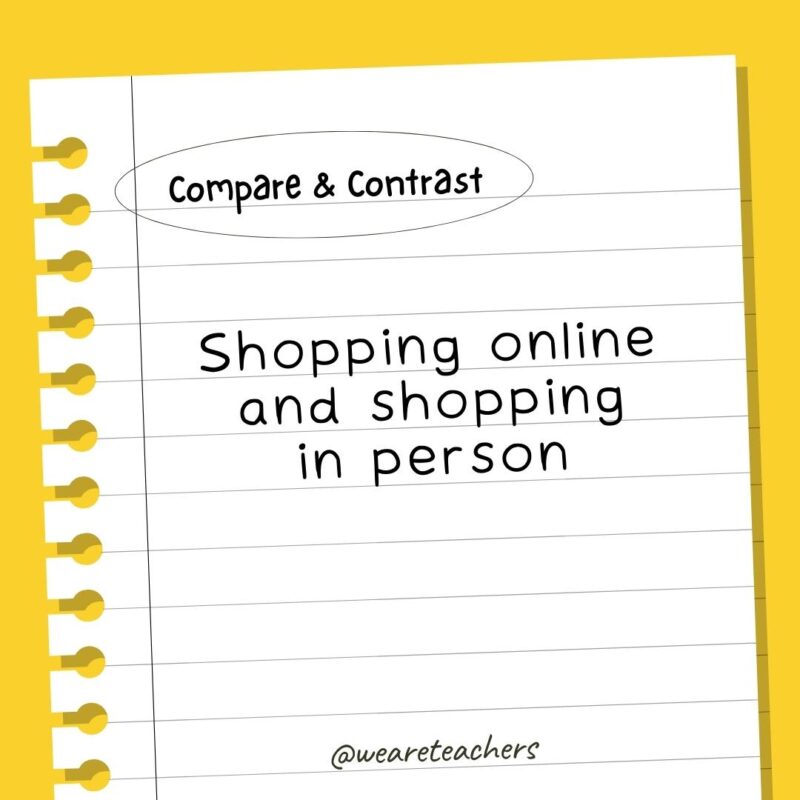
History and Politics Compare and Contrast Essay Topics
- Capitalism vs. communism
- Socialism vs. communism
- Monarchy/dictatorship and democracy
- Two political candidates in a current race
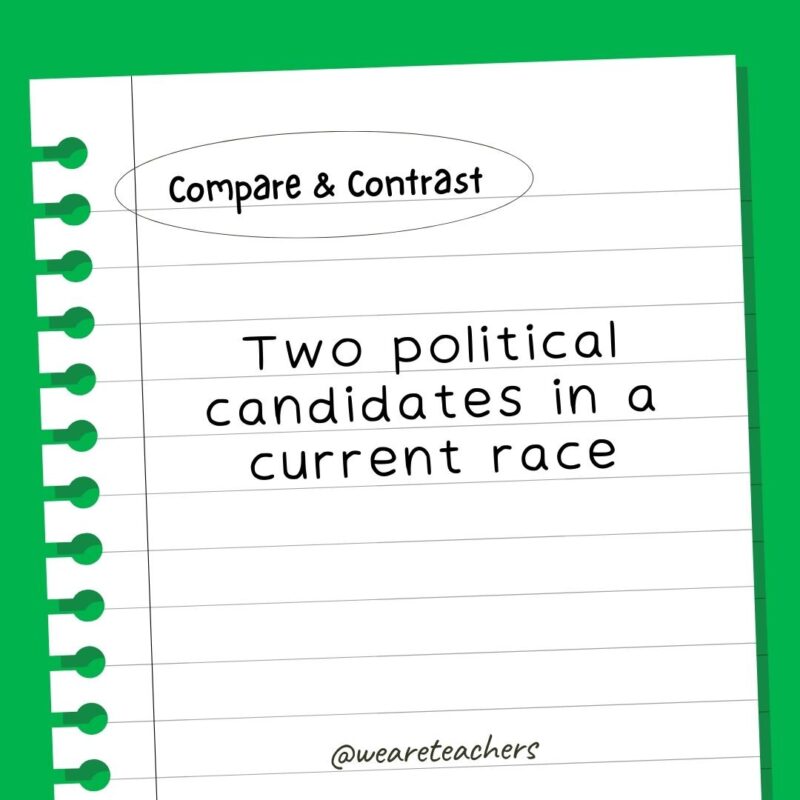
- Spanish flu pandemic vs. COVID-19 pandemic
- World War I and World War II
- American pioneers vs. first space explorers
- Gen X vs. Gen Z
- Abraham Lincoln vs. Barack Obama (or any other two presidents)
- Any two U.S. states
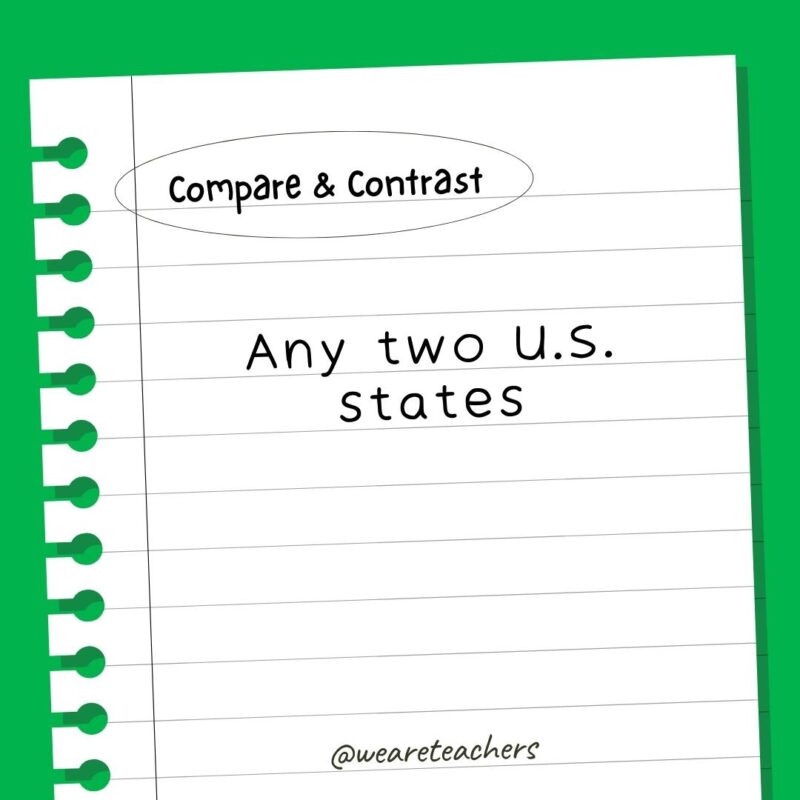
- Any two historic eras
- Queen Elizabeth I vs. Queen Elizabeth II
- Republicans and Democrats
- Hitler and Stalin
- The first airplane flight vs. the first manned spaceflight
- American president vs. U.K. prime minister
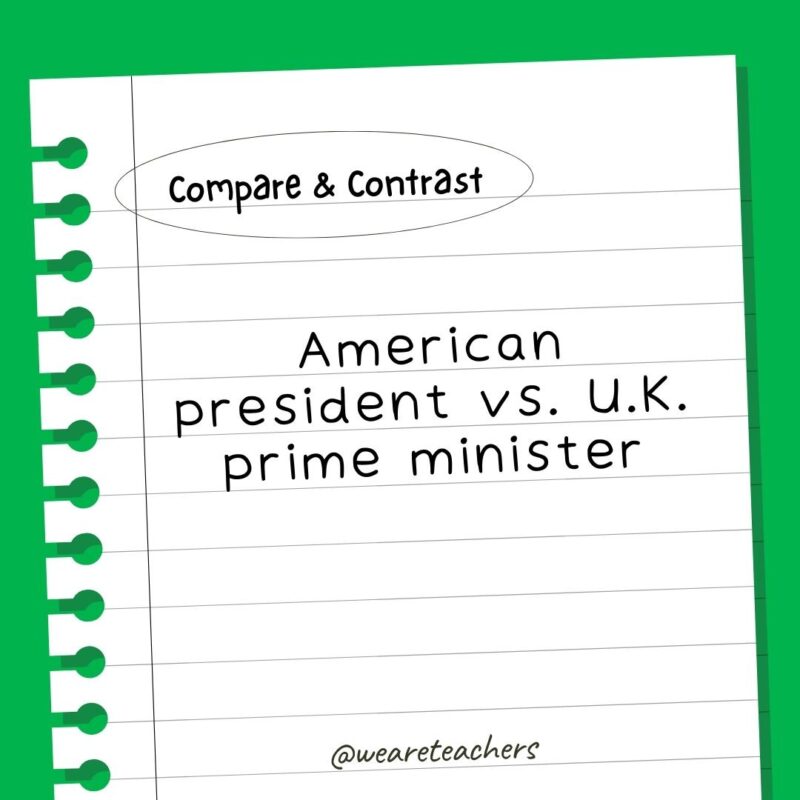
- Fox News vs. CNN
- Legislative branch and executive branch and/or judicial branch
- Equality and equity
- Elected politicians vs. lobbyists
Just for Fun Compare and Contrast Essay Topics
- Dogs vs. cats as pets
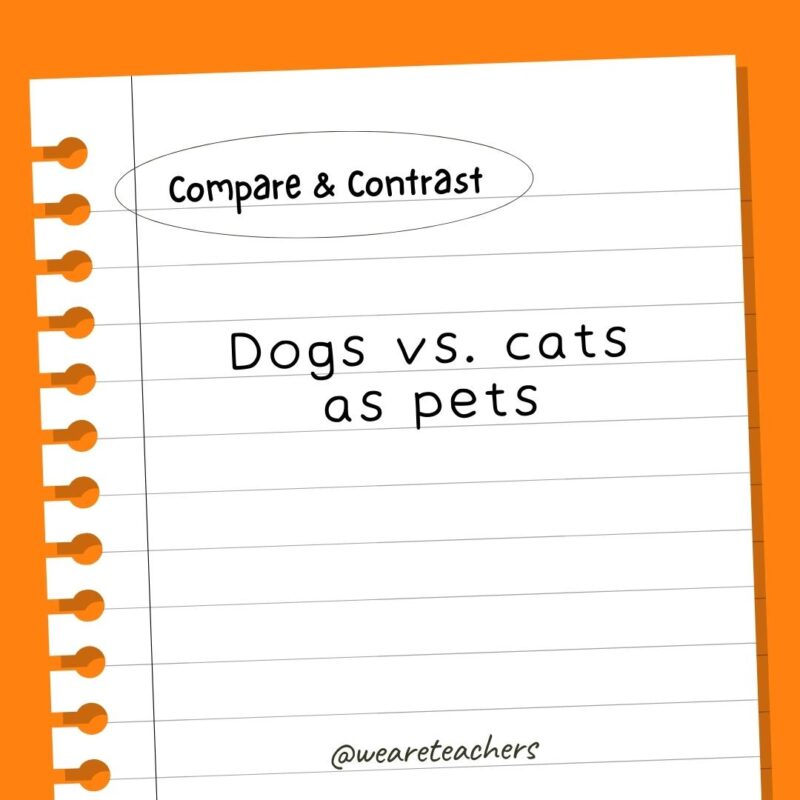
- Paper books or e-books
- Hot dogs vs. tacos
- Summer and winter
- Fall and spring
- Big Mac vs. Whopper
- Coke vs. Pepsi
- Chocolate shake vs. hot chocolate
- Any two superheroes or villains
- Mondays and Fridays
- Mornings vs. evenings
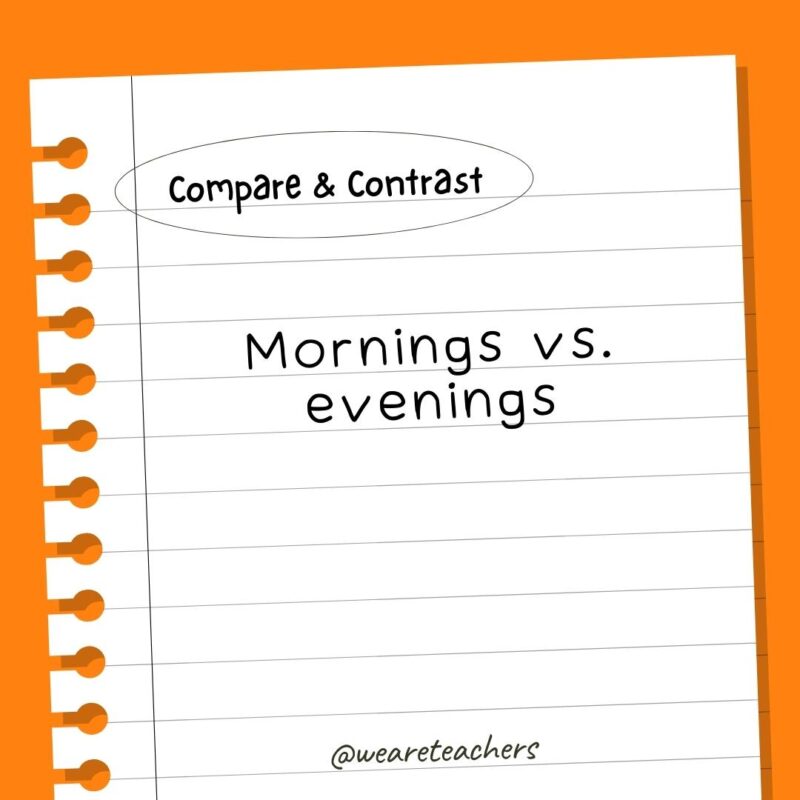
- First day of school vs. last day of school
- Christmas vs. birthdays
- Hurricane vs. tornado
- Birthday as a kid and birthday as an adult
- Going barefoot vs. wearing shoes
- Appetizers and desserts
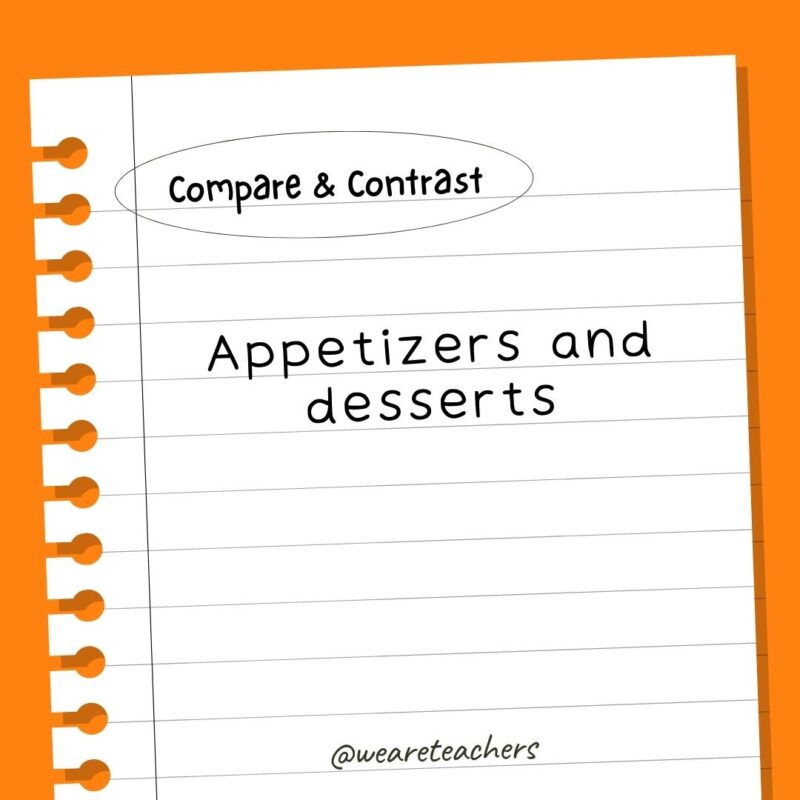
- Phone calls and texting
- Pants vs. skirts
- Electric cars vs. gas-powered cars
What are some of your favorite compare and contrast essay topics? Come share your prompts on the WeAreTeachers HELPLINE group on Facebook .
Plus, check out the big list of essay topics for high school (100+ ideas).
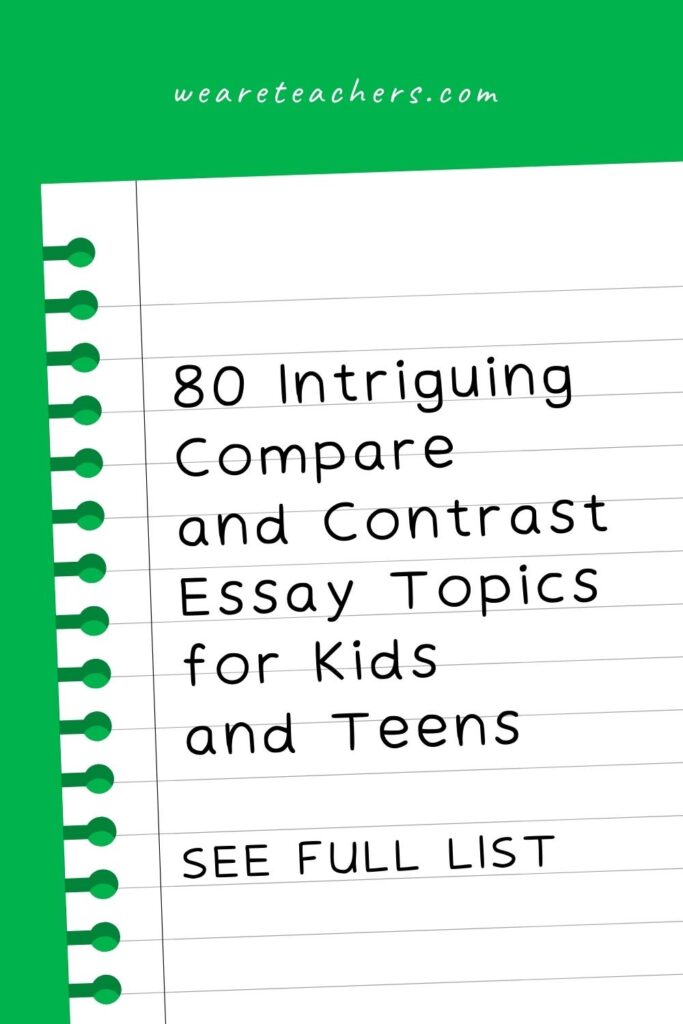
You Might Also Like
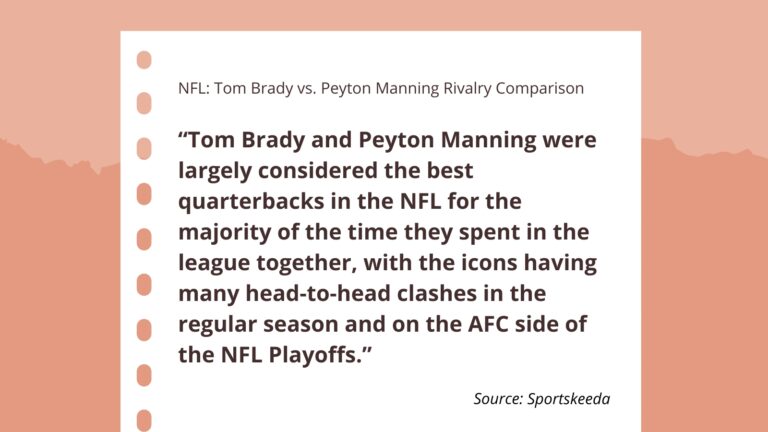
34 Compelling Compare and Contrast Essay Examples
Topics cover education, technology, pop culture, sports, animals, and more. Continue Reading
Copyright © 2023. All rights reserved. 5335 Gate Parkway, Jacksonville, FL 32256

IMAGES
VIDEO
COMMENTS
Access the most comprehensive library of K-8 resources for learning at school and at home. Bring learning to life with worksheets, games, lesson plans, and more from Education.com.
Essays in 6th Grade: A Basic Format that Elevates the Standard 5-Paragraph Structure. 6th grade is such a funny year. Funny haha and funny weird. Student writing levels are all over the map. You will have students coming to you writing on a very elementary level, still needing loads of help with grammar and paragraph formation.
Narrative Essay Topic Ideas for Students. Argumentative Essay Topics for Middle School. Expository Essay Topic Ideas. Story Writing Topics for Grades 5 - 9. Essay writing curriculum 6th grade. These 37 essay topics for 6th graders will help your kids form opinions, explore their ideas on paper, and express their thoughts confidently.
These paragraphs should also be three to five sentences each. Finish your sixth-grade essay by writing the final paragraph, which is its conclusion. Summarize the statements made in the body paragraphs to reiterate the thesis statement made in the first one. Persuade the reader to see your view on the topic, based on the points made throughout ...
In the first year of middle school, kids are expected to write essays and stories, share their writing, and compare literary texts. This year, your sixth grader should learn to use precise language, the right pronouns, and high-quality sources for research. Public presentations are also a nerve-wracking but important skill highlighted this year.
Here are some fun and inspiring essay topic for 6th graders: Describe your favourite place. Describe your ideal bedroom. Describe the house in which you grew up. Describe what the first house on the moon would look like. Describe some of your favourite places in your hometown.
Looking for a solid persuasive essay topic for your 6th grader? The below post contains tons of great ideas that will get your 6th-grade students thinking, researching, debating, and writing! I'm not talking about simple opinion writing topics - like their favorite food, favorite book, or how much money they should get for an allowance.
These prompts will help your sixth graders learn the essentials of procedural writing. 26. Make a user guide for anything you use frequently (e.g., your computer, smartphone, video game console). 27. Write a set of instructions for cleaning your room. 28.
With practice and guidance, you can become a confident and skilled essay writer. 33 6th Grade Essay Prompts. Here are 33 essay prompts for 6th grade students: 1. Write about a time you tried something new. ... types of essays will help you choose the best approach for your topic and write a well-structured and effective essay. Narrative Essays.
The five-paragraph essay format is a guide that helps writers structure an essay. It consists of one introductory paragraph, three body paragraphs for support, and one concluding paragraph. Because of this structure, it has been nicknamed the "hamburger essay," the "one-three-one essay," and the "three-tier essay.".
Using these creative writing prompt categories, 6th grade students can develop their writing abilities while letting their imagination soar. Essay Writing Prompts. In this section, we explore a variety of essay writing prompts for 6th-grade students. These prompts are categorized under opinion essays, informative essays, and persuasive essays.
We always start with simple paragraphs. Yes, this is basic, but if your students cannot write excellent paragraphs, their five paragraph essays will be train wrecks. Trust me! We spend a while cementing paragraph structure: Topic Sentence. Detail #1. Detail #2. Detail #3. Closing Sentence.
Oakdale Joint Unified School District. 168 South 3rd Avenue. 6th Grade Writing Samples - Oakdale Joint Unified School District.
Choose from 100 prompts, story starters, research topics, and poetry ideas to start the writing process in a sixth-grade classroom.
Here is a plan to follow in writing a personal narrative: Choose a good topic. This would be based on something from the student's life. The essay will not only tell the story of what happened, it will also include the student's analysis of the story. Should highlight the writer's creative skills in story-telling.
Here, we are providing 6th Grade Essays in English for children to make habitual with different categories of essays. List of 6th Standard English Essays for Students. APlusTopper provided Essay Topics for Class 6 students is very beneficial to win first prizes in the essay writing competitions and good scores in exams.
These powerful 6 th grade writing prompts are designed to help students think critically about some of the most important issues they face in today's world. With questions on topics like bullying and Internet usage, your students will have the chance to reflect on what it means to be a teenager today and how popular culture influences their ...
With these 33 new argumentative essay topics for middle school students, you can help your students learn more about what makes a good argument and how to evaluate and decipher so-called "evidence.". As they explore topics like the ways in which schools handle bullying and whether or not the Pledge of Allegiance should be required in ...
101 Interesting Persuasive Essay Topics for Kids and Teens. Use your words to sway the reader. Persuasive writing is one of those skills that can help students succeed in real life. Persuasive essays are similar to argumentative, but they rely less on facts and more on emotion to sway the reader.
Open an Interactive Worksheet, and create a direct link to share with students. They'll enter their code to access the worksheet, complete it online, and get instant feedback. You can keep track of submissions in My Assignments. Learn more about Interactive Worksheets. Show interactive only.
Grade 6 B.E.S.T. Writing Sample Test Materials The purpose of these sample test materials is to orient teachers and students to the appearance of passages and prompts on paper-based accommodated B.E.S.T. Writing tests. Each spring, students in grades 4-10 are administered one text-based writing prompt for the B.E.S.T. Writing test. Students will
Find interesting and unique informative essay topics for kids and teens here. Tell them what you know. ... Search for: Grades Grades. All Grades K-5 All Grades 6-12 PreK 6th Grade Kindergarten 7th Grade 1st Grade 8th Grade 2nd Grade 9th Grade 3rd Grade 10th Grade 4th Grade 11th Grade 5th Grade 12th Grade. ... Informative essays are a chance to ...
100 Thought-Provoking Argumentative Writing Prompts for Kids and Teens. Practice making well-reasoned arguments using research and facts. Writing a strong argumentative essay teaches students to make a case for their own point of view without relying on emotion or passion. These argumentative essay topics provide options for kids of all ages ...
The first drafts of her essay focused on growing up in a low-income family, sharing a bedroom with her brother and grandmother. But it didn't tell colleges about who she is now, she said. Her final essay tells how she came to embrace her natural hair. She wrote about going to a mostly white grade school where classmates made jokes about her afro.
All Grades K-5 All Grades 6-12 PreK 6th Grade Kindergarten 7th Grade 1st Grade 8th Grade 2nd Grade 9th Grade 3rd Grade 10th Grade 4th Grade 11th Grade 5th Grade 12th Grade. ... In compare and contrast essays, writers show the similarities and differences between two things. They combine descriptive writing with analysis, making connections and ...